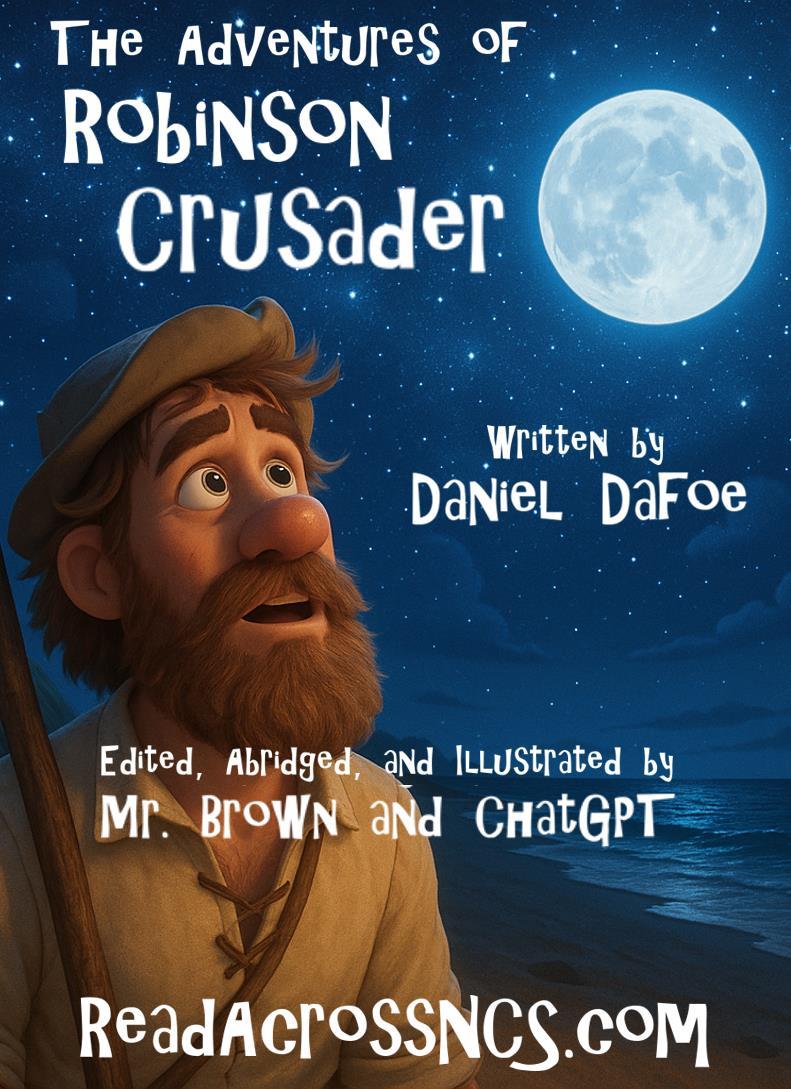

“The Life and Adventures of Robinson Crusoe” was first published in London, England in 1719. Possibly inspired by a true story, it is popularly credited with being the very first realistic novel of fiction. Stated more simply, it may have been the very first believable story that, although completely made up, could have really happened. And, because this may have been the very first work within the genre of realistic fiction, because it was written in the first-person, and because it was written so vividly by author Daniel Defoe, many in England initially believed the story to be true.
This is a book that I have come back to several times over the course of time. As a student, I first encountered the story as a movie. Then, inspired by the movie, I read a “condensed” version of the book before ultimately reading the full book as it was originally written. As someone who loves the outdoors, I have always enjoyed the story because of the realistic sense of
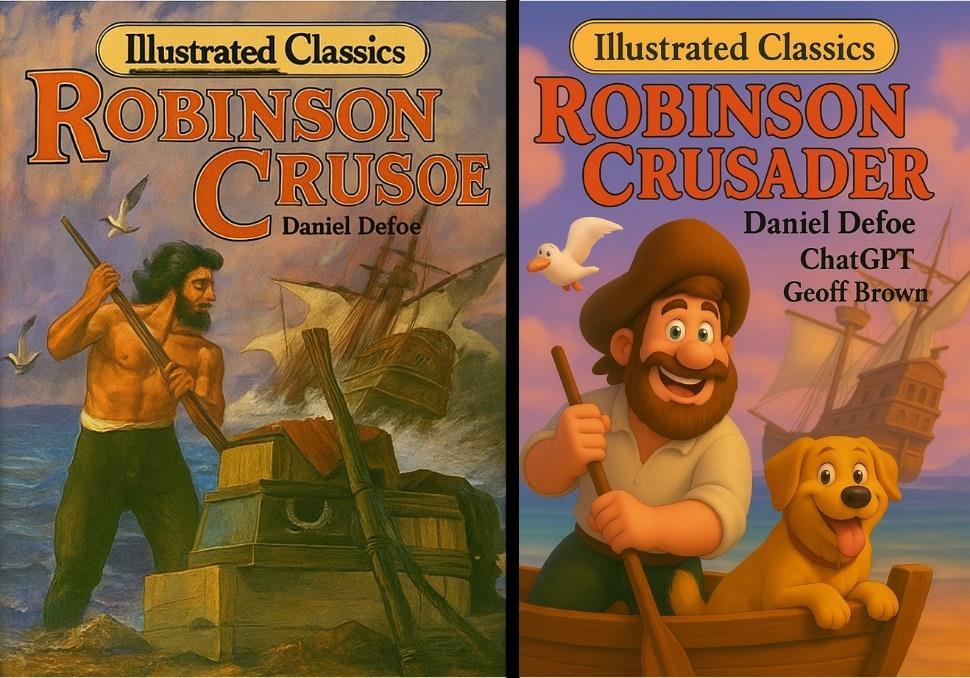
adventure and the richness of the way in which the story is presented.

In short, as a student, I could imagine myself “there” and inside the story. For this year’s first ReadAcrossNCS.com, I am hoping that the same is true for you and your family! (And, yes, there will be a second ReadAcrossNCS.com in the spring. I cannot help myself.)
This book entered the “public domain” in 1731. This means that the book has been independent of a copyright for nearly 300 years. As a result, with sincerest apologies to Mr. Defoe, we have the legal opportunity to change up the name of the protagonist to better suit our school, embrace the meat of the story while spitting out some of the bones, and have a bit of fun with the adventurous plot.
Over the last year, with a bit of help from ChatGPT, I have taken the book and rewritten it on two levels. Level 1 strips away some of the difficult vocabulary, simplifies sentences, and omits many of the events that some students may not enjoy or understand. I have also taken the book and left it–more or less–unchanged, calling this version “Level 2”. In this case, in order to fit the book into the week that we have designated for reading it, I have edited it for length. And, in these
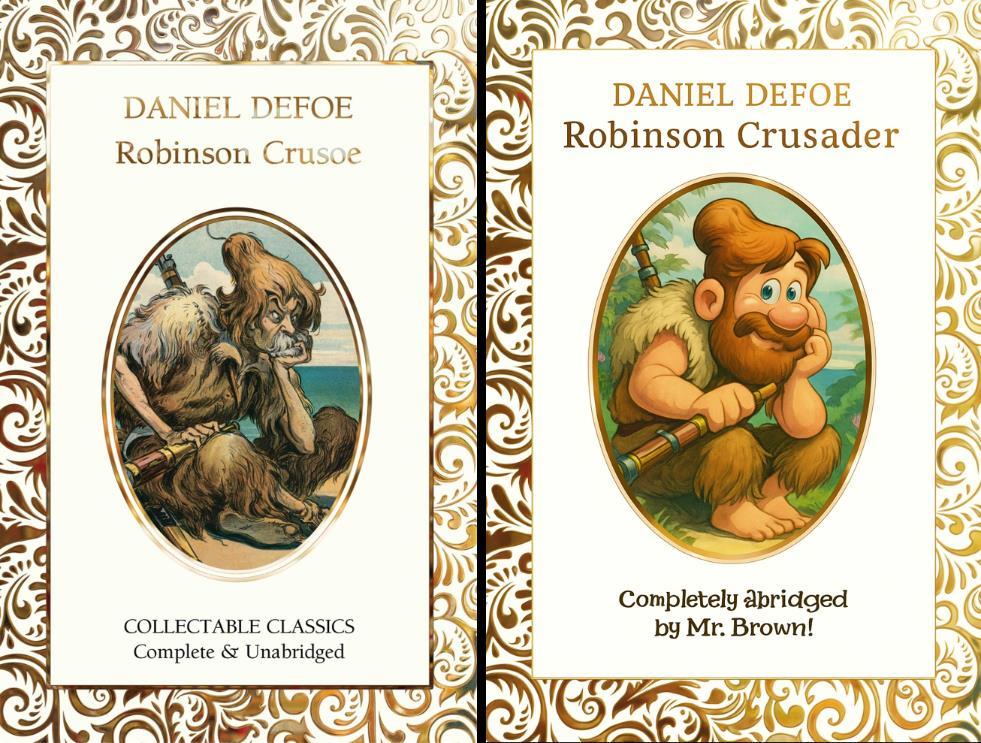
edits, I have also pulled out some of the plot points that conflict with a Biblical worldview.
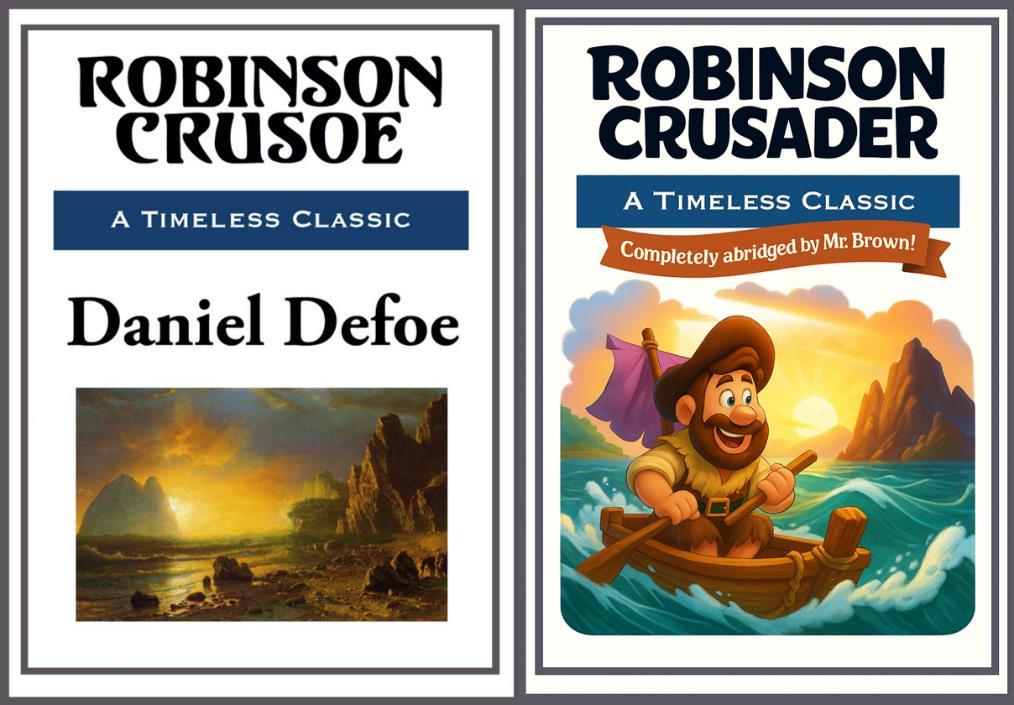
I would invite most families to enjoy Level 1. Even so, if you elect to pursue Level 2, I would encourage you to not feel obliged to finish this version within the week of ReadAcrossNCS.com. I am hoping that you will love the story and the experience of reading it together as a family. If that is the case, please permit the fun to extend past the week.
Also, Level 2 is for students and families who are looking for a challenge or are hoping to see how Level 1 compares to Defoe’s original. Of course, my hope is that, someday, you will return to the original and both enjoy the strong points and wrestle with the weak points. That is, after all, the hallmark of both good and classic literature. In this instance, we have the honor of spending time within a book that can be described as both.
This idea of editing is interesting–editing for Biblical worldview–because while I have removed some of the issues (drinking to excess, for example), I have left others in the story. In the case of the latter, within Level 2 you will run into uncomfortable notions like racism, colonialism, cannibalism, and more. (The cannibalism is very, very much reduced!) In these instances, while I have toned them down a bit but, ultimately, I hope that you will enjoy within your home the resulting discussions that will illuminate these topics using the light of Scripture.
To assist your family with discussions, I have added “Questions to Consider”. Having divided the book into daily sections, one each for each of the evenings that your family has been invited to read, I have placed these discussion questions at the end of the
section. This is true for both levels.
I hope that this forthcoming week is a very memorable one for your family–one that inspires future, similar, whole-family reading adventures in your home. To help accomplish this, Read Across NCS Fall 2025 offers two things.
First, at this point, having realized that I have mysteriously disappeared from campus and, in effect, become a Robinson Crusader, stranded in the wilderness and attempting to make my way home, each day on ReadAcrossNCS.com, I will somehow manage to post a video of my adventures. As you watch me struggling in the wilderness, your family will experience with me all of the thrills and perils that I encounter. You will also have the opportunity to assist me in my adventures and, hopefully, help me to return to campus by the last of Read Across NCS Fall 2026. As you watch my daily video posts, you will be given a choice, an opportunity to help me to make a decision about the direction of my adventures. If you read that evening’s section of this book, and thereby acquire the outdoorsy, survivalist, and adventurous knowledge that you will require to make an informed decision, you will be able to vote for which direction your family collectively believes that I should take. Each morning, I will then tabulate the votes and follow your collective guidance with hopes of rescue and safety!
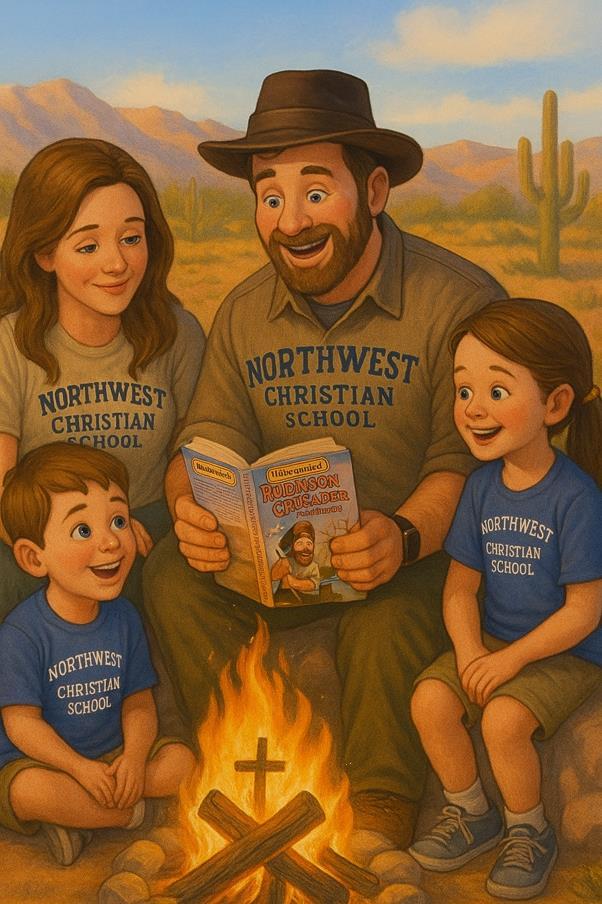
Second, this year within Read Across NCS Fall 2025, we are approaching our reading fun a bit differently. In years past, we have challenged you to read as many minutes as possible. This year, however, we are inviting your family to enjoy this reading adventure together as a family! Specifically, to earn your vote–the vote you will use to guide me through the wilderness and back home–you will read that evening’s section of “Robinson Crusader” together. I am hoping that you will use this week to set aside
time together, to slow down and back away from the hectic, and work through Robinson Crusader as a family!
Please enjoy the week ahead! And, consider starting a new family tradition!
My name is Robinson Crusader. I was born in 1632 in the city of York which is in Great Britain. As such, I am an Englishman, through and through. My family, the Crusader family, was good and respected, though my father came from another country, Bremen. He first settled in the British city of Hull, worked very hard, kept long hours, and became rich and successful in his trade. After retiring, he moved to York and married my mother, whose family name was Robinson. That’s how I got my name, Robinson Crusader.
I had two older brothers. One became a soldier and died in battle. This devastated my family and, because we were not established in the truths of God’s word, in a sense, I guess we became shipwrecked on the rocks of grief.
My other brother fell in with rough friends and eventually he left home for reasons I do not know. We never heard from the other again.
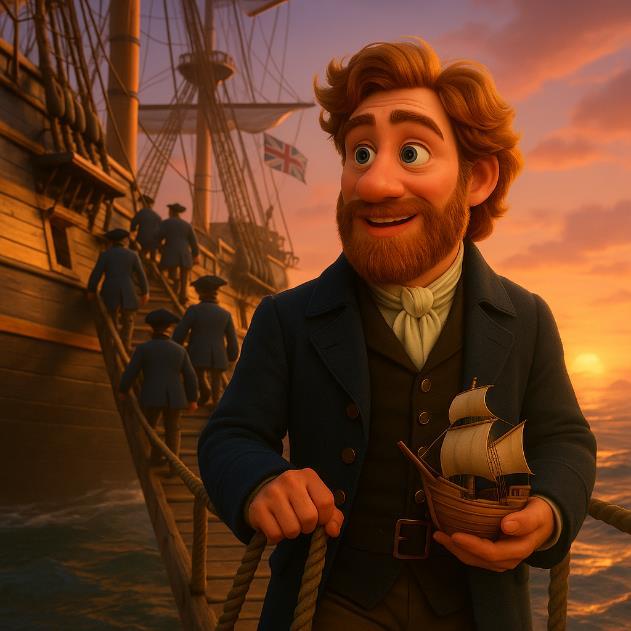
As the youngest son, I wasn’t trained for a job. My father gave me a good education and wanted me to become a lawyer.
But I only wanted one thing I wanted to go to sea and find treasure. I spent many hours gazing out upon the ocean, imagining adventures on the high seas in the tall sailing ships that I saw come into and leave from the harbor. I wondered if there were strange, new lands to see and exotic people to meet.
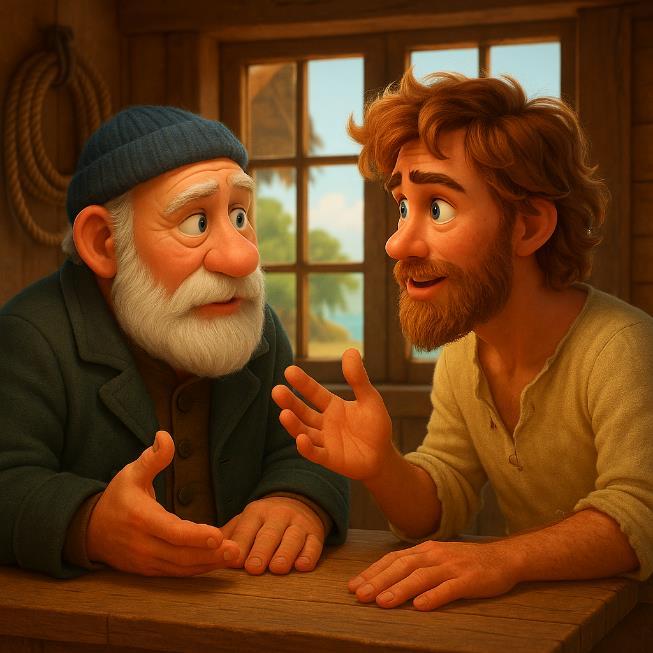
But, I also wanted wealth and gold. But, I had grown lazy and I was used to the wealth of my family. Though my father had labored hard to earn his riches, I had not seen his hard work or experienced the years it takes to learn a trade and earn money. Sadly, I wanted what I had not earned. When I was still young, nineteen years old, I put together a plan to leave home, join the crew of one of the ships I saw day after day in the harbor, and set sail for the adventure I craved and the riches I desired.
One day, while resting from illness, my father called me to his room. He asked why I wanted to leave home and give up a peaceful life. He explained that people in the middle class like us were the happiest. They avoided the struggles of both the very rich and the very poor. He reminded me that many people dream of the calm life we had. He said that peace, health, and joy come from living simply and wisely. My father was a kind man and smart in the ways of the world. But, he had never known God or discovered the truths of His word. And, though his words sounded wise, they did not awaken within me a desire for God or His ways. Sadly, my mind and heart did not change.
He begged me not to chase a dangerous life. He promised to help me if I stayed and lived the life he believed was best. He reminded me about my older brother who died young. Then my father cried and said that if I left, God could not bless my choice.
I was deeply moved by his words and promised to stay. But after a few days, my desire to travel returned. I talked to my mother instead. I told her I wouldn’t be happy unless I saw the world. I begged her to ask my father to let me go just once.
She became upset and refused. She told me she would never go against my father and couldn’t be part of my plan. Still, I later heard that she told my father what I had said. He sighed and said, “That boy could be happy if he stayed home. But if he goes, he will be the most miserable man alive.”

About a year later, while visiting Hull, I met a friend whose father was sailing to London. My friend invited me to go along for free. I didn’t ask my parents. I didn’t even tell them. I left without their blessing or God’s blessing.
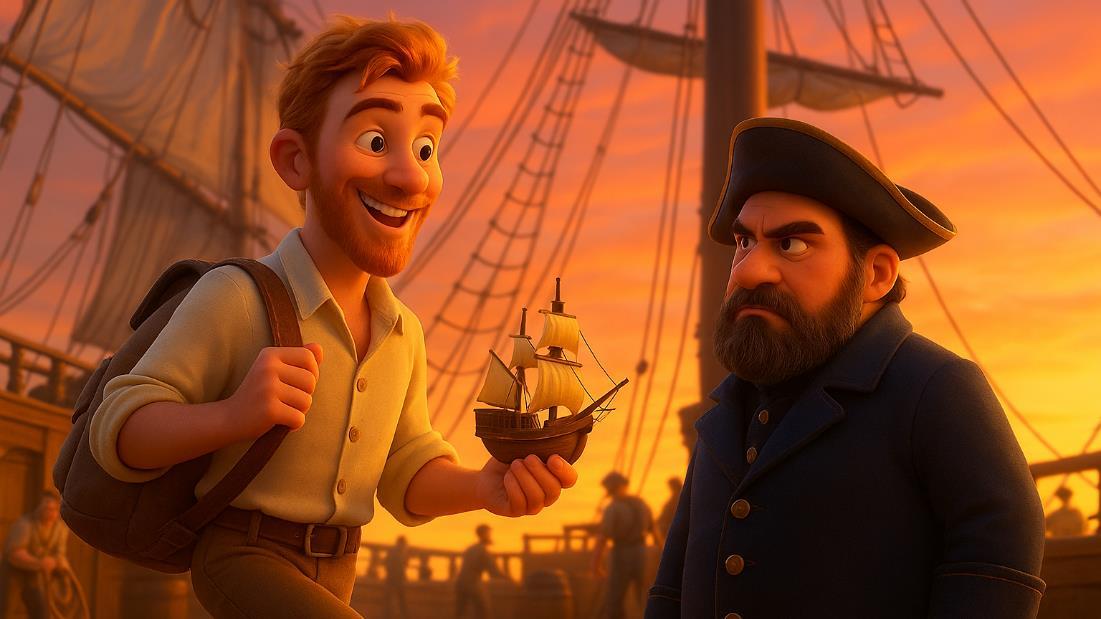
I know now that was the day my real troubles began. I boarded the ship of my friend’s father and set off in hunt of riches and adventure

The ship was incredible to see, with six cannons, two masts with sails, and fourteen men. It was exactly what I pictured in my mind when I imagined going on adventures in a sailing ship!
But, I should have seen then the foolishness of my decision. None of these men seemed happy. Or, rich. Even my friend’s father, the captain of the ship, seemed miserable most days. In terms of riches and happiness, what did I expect to gain from these men if they did not have it to give?
The ship carried simple trade items like beads, scissors, and little mirrors to exchange with the natives on the islands that we would visit. Now, this hardly seems like a way to grow rich. But, I was stubborn and young. I would not listen to anyone once I had made up my mind.
The life on board a ship is hard. The days are long and finding time to sleep is difficult There was no time for games, reading, or relaxing. Most days, I was happy if I had four hours, all together, to sleep. The work is back-breaking. The wind, the sea air, and the constant sun upon my skin turned me dark. Soon, I looked much older than I was.
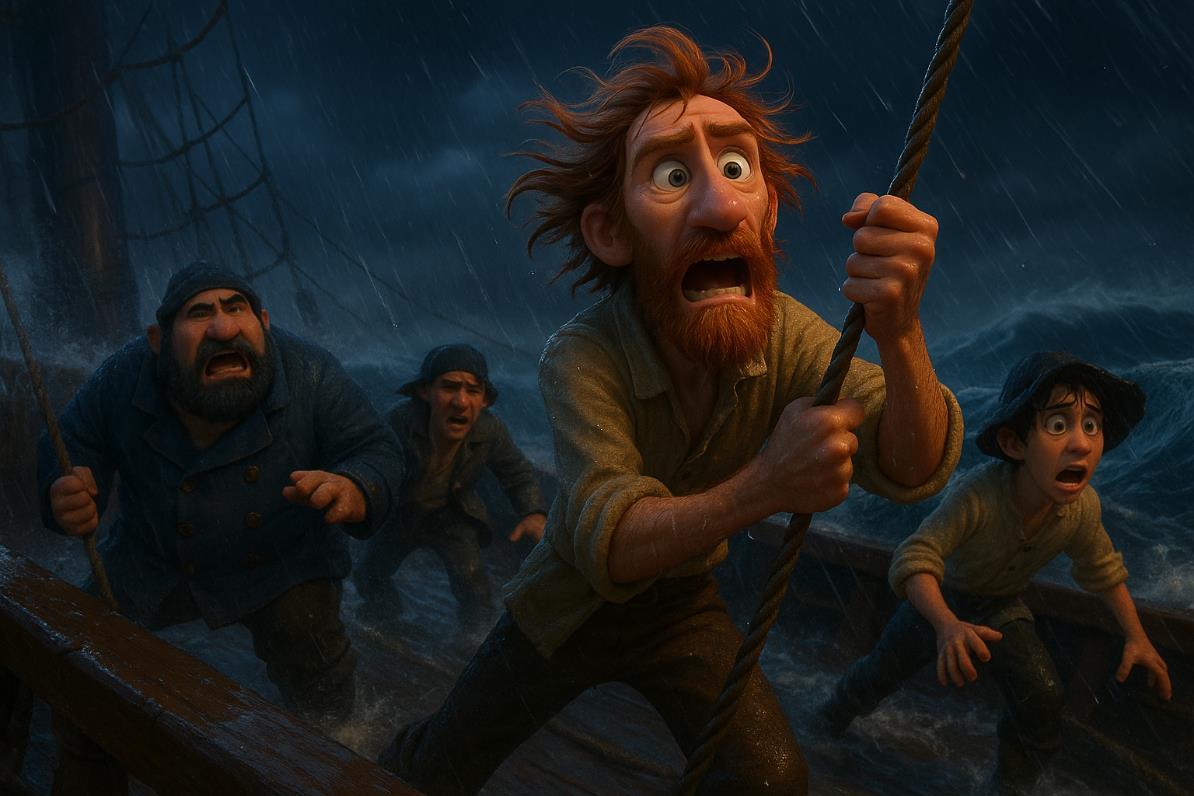
At first, the weather was hot but calm. But after about two weeks, a terrible storm hit us. The wind was wild and it made waves in the water that were nearly taller than the boat. The wood of the boat held together but I could hear it creaking and groaning constantly due to the stress of wind and wave.
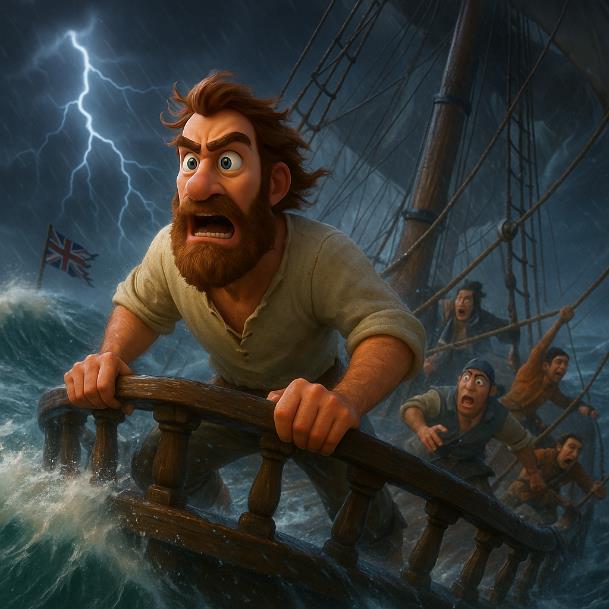
For twelve days we could do nothing but drift in whatever direction the wind carried us. One man died of a fever, and two others were swept overboard. Though we looked to find them, we also knew that they were lost the moment the sea swallowed them.
Eventually, the storm weakened, and the captain figured out we were far off course, near the coast of South America. Our ship was damaged, so we planned to head toward the English islands in the Caribbean for help.
But another storm came and it was worse than the first. It pushed us further off course. And, the ship endured even more damage. We began to fear that we would sink there in the midst of the sea. We were worried that our ship and souls would be lost and that no one would ever know what happened to us.
Then, one morning, we spotted land. We were excited and all standing on the deck staring off at this island, wondering what we had found. But before we could react, the ship suddenly crashed into a sandbar and was torn apart by huge waves. We had one small boat left, so the crew and I climbed into it, hoping to survive.
The waves were huge and wild. We rowed hard toward land, but a giant wave flipped the boat. I was tossed under water and pulled by the current. Somehow, I was pushed closer to shore. I struggled to stay above water and swam with all my strength. I hit a rock hard, which knocked the breath out of me, but I held on. Wave after wave pushed me, and finally, I made it to land.
I was the only one who survived.
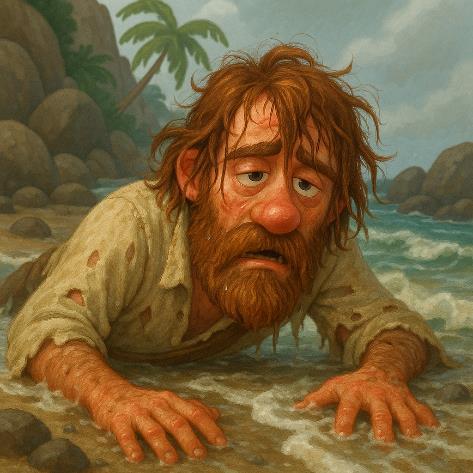
I sat on the beach, amazed that I was alive. I thanked God for saving me. As I looked around, I saw no sign of my crew just a few hats and shoes. I looked out at the broken ship, wondering how I had survived when no one else did.
But then I realized my troubles weren’t over. I was wet, alone, and had no food or clothes. I had only a knife. I feared I’d die from hunger or be attacked by wild animals.
I found a tree with thick branches and, since it was now evening, I decided to sleep in it for safety. Before climbing up, I found a small stream and drank from it.
That night, high in the tree, holding a stick for protection, I fell asleep.
I was happy to be alive. But, all night, I dreamed of the ship hitting the sandbar, of the crew being lost to the sea, and of the wild and dangerous creatures that must surely live upon this island.

QUESTIONS TO CONSIDER AS A FAMILY:
1. Robinson says that his family was “shipwrecked on the rocks of grief” when his oldest brother died. What do you think that means?
2. Robinson’s father gave “good” advice to his son but not “Godly” advice. Robinson’s father did not know the Lord and did not know the truth of God’s word. He wanted his son to be safe at home. Psalm 37:4 tells us that God gives us the desires that we have in our hearts. Was Robinson’s desire for adventure bad? If God made Robinson to desire adventure, is there a God-honoring way that it could have happened?
3. Why do you think God allowed Robinson to be the one member of the ship’s crew that survived?
When I woke up, the storm was over. The sea was calmer, and I noticed something amazing the ship had been moved closer to shore by the tide and was now only about a mile away. I hoped I could get to it and find food and tools.
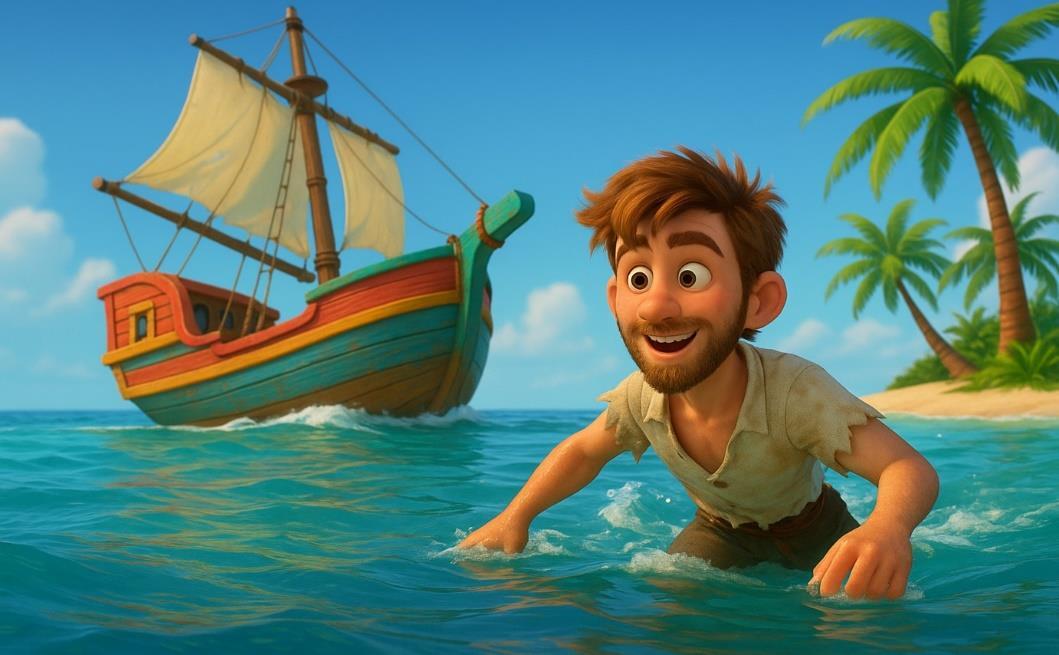
I climbed down from the tree where I had slept and saw our small boat far away on the shore. I couldn’t reach it because a wide stream was in the way, so I decided to focus on reaching the ship instead. When the tide went out, I was able to get close to it and swam the rest of the way. I found a rope hanging down and used it to climb aboard.

Inside the ship, most things were wet and damaged, but the back part was dry. I filled my pockets with biscuits, found some dried meat and rice, and ate as I worked. I knew I needed to build a raft to carry supplies back to shore. I tied together wood from the ship and made a raft strong enough to hold what I needed.
I loaded the raft with food, clothes, tools, guns, and even barrels of gunpowder. I had no sail or oar, but the sea was calm and the tide was going in. Slowly, the raft floated toward shore. I saw a small creek and steered the raft into it. It nearly tipped over when one end got stuck, but I held the supplies steady until the water lifted the raft again.
I found a safe spot near the creek to unload. Then I made a second trip and brought back even more hammers, saws, nails, and even a grindstone. I also found muskets, bullets, and some more food. Each trip I made, I brought more helpful things from the ship. I also found a small dog – a mutt of no particular breed – but we were happy to see each other!
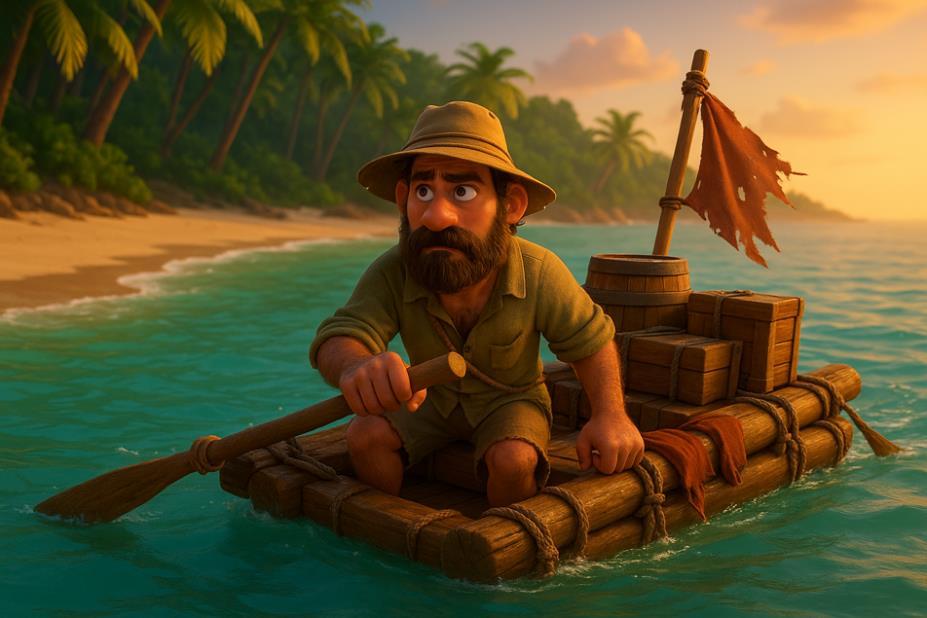
One day, I found a hidden drawer with coins and gold. I laughed, because it was useless on a deserted island. Still, I took it. Soon after, a strong wind began to blow. I quickly swam back to shore just in time by morning, the ship had broken apart and was gone.
With my supplies safe, I looked for a better place to live. I found a small hill with a flat spot in front of a rock wall. I made a tent using sailcloth and built a strong fence from wooden stakes and old ropes. I added a ladder to climb over the fence and pull in after me at night for safety.

At last, I had food, tools, and shelter. I thanked God for helping me survive and keep going.
With great effort, I carried all my supplies food, tools, and weapons into the fenced area I had built. I made a big tent to protect myself from heavy rain, using sails I saved
from the ship. Inside the tent, I set up a hammock from the ship to sleep in instead of the bed I first brought ashore.
To keep things dry and safe, I stored all my food inside the tent. Then, I started digging into the rock behind my shelter, building a small cave that acted like a cellar.
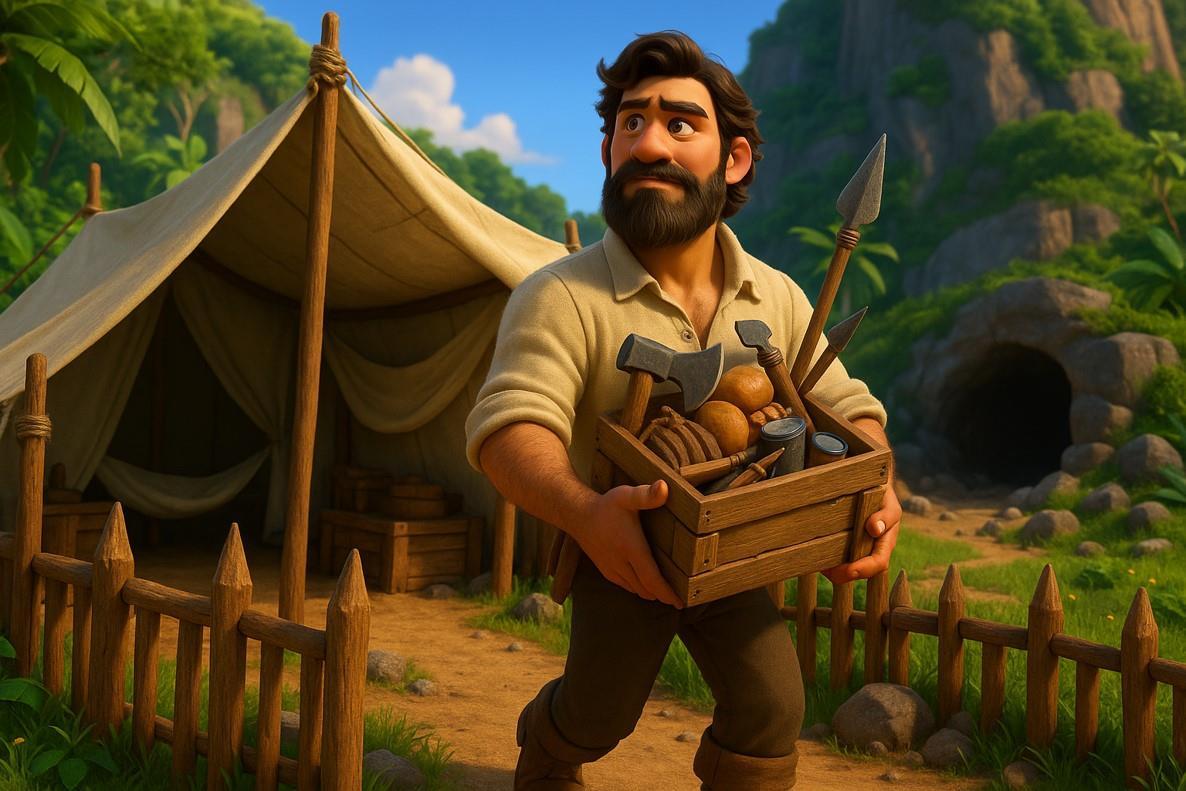
It took many days and hard work to finish this project. But, in the end, looking over what I had created with my very own hands, I experienced something that I had never felt before: contentment.
I went out daily with my gun to hunt and explore. I soon discovered there were goats on the island. This excited me, but they were fast and easily frightened. I watched them and learned they could see me easily when I was below them, but not if I was above. So, I climbed rocks to sneak up on them.
With my home now better set up, I needed a place to cook and fuel to burn. I also continued digging and improving my cave, adding more helpful tools and storage. But during quiet moments, I thought deeply about my life.

I was sad and afraid. I had been driven far off course by a storm, and no people lived near. I believed I might die on this lonely island. I cried and asked why God would leave me so alone.
But then I reminded myself I had survived. Ten others were lost in the sea. I had food, shelter, and tools. What if the ship hadn’t floated near shore? I wouldn’t have anything. I thanked God for what I had and made plans to live wisely, even if my supplies ran out or I became sick. I began to accept my new life and promised to take things day by day.

I also started a journal to make a record of my adventures. At this point, I did not know if I would ever make it off this island alive. And, if someday an explorer found what remained of me and my new home, this journal could provide my family and friends back home some sense of my fate, and with hope, some of the peace that eluded me.
Here are some of the pieces of my journal which describe what happened in the coming days.
October 1–24
For many days, I worked hard bringing supplies from the ship. One day, I tipped over my raft and lost some items, but I recovered most of them.
The day that I tipped over my raft had been an important misadventure. I had been working to pull what little remained from the scattered wreckage of the boat that had brought me to this island. Because I had grown used to my raft and the paddling, I also grew careless. In my carelessness, I stood too close to the edge of the raft and not in the center which would have helped to keep balance. And, when balance was lost, the whole raft tipped over and my few supplies were lost. In that moment, I realized that this island was not a child’s play space. It was a living, dangerous creature that would reward the wise but punish the foolish.
October 25–31
A storm smashed what little remained of the ship completely. I decided to find a safer home and chose a
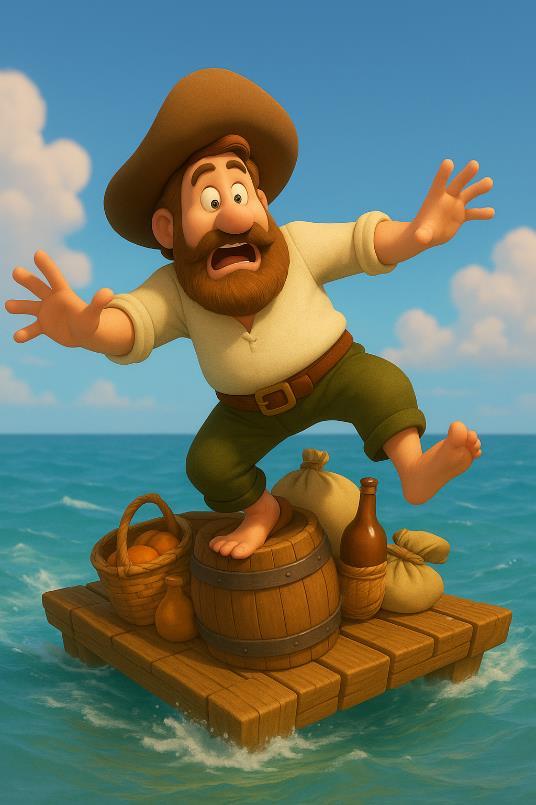
spot under a rock. I built a fence and began moving everything there. I also went hunting and brought home a goat.
These days, once again, found me growing in my appreciation of the danger of this place. When the storm hit, the waves surged without warning towards my shelter, flooding it. I realized that if this had happened while I had been asleep, I might have drowned. I thanked God that he allowed this small tragedy in order to teach me, grow me, and safe me from the potential of other, larger disasters.
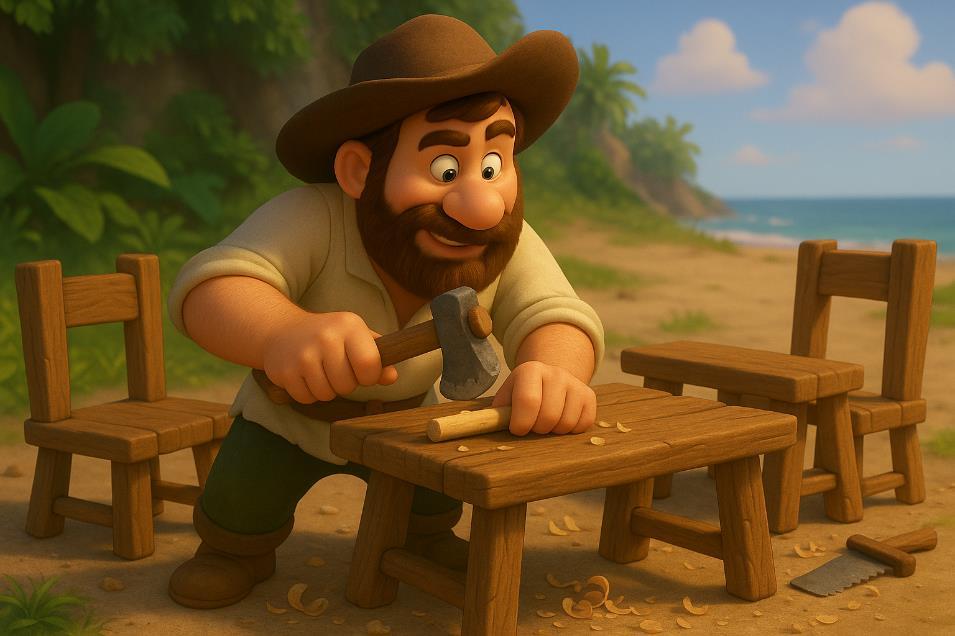
November
I built a tent, arranged my supplies, and made a table and chair. It wasn’t perfect, but I was learning. I also made small boxes to store my gunpowder safely. I kept hunting and even saw seals, which surprised me. I tamed a wild goat after fixing its broken leg, and this gave me the idea to raise animals.
December to January
I worked on digging a cave into the rock behind my tent. It would serve as storage and a place to stay dry. One day, part of the cave’s roof collapsed! I fixed it with wooden posts. Then, I made shelves and moved everything inside. I also tried making new tools like a shovel and a clay lamp for light, since I had no candles.
During the months of November to January, two amazing things happened.

First, as I said in my journal, I found a goat with a broken leg. Initially, my thought was to make a meal of it but the little creature looked so helpless and miserable, I could not bring myself to do it. Over several days, I nursed the poor thing back to health and, though his leg did not heal perfectly, it did heal and the goat could walk. When it did walk, it did a surprising thing: it followed me around my home and the island. What had once been a wild creature, once it had experienced pain and healing, came to love its healer. And, in turn, I had come to care for it too. I wondered if God had used this little goat to teach me something about myself.

Second, I found barley and rice growing where I had tossed out feed for the goat. I had not planted anything, so I believed it was a miracle from God. It gave me hope and made me thankful. It allowed me to save every seed to grow more.
February to April
I built a strong wall around my home with wooden posts and turf, making it hard to see from the outside. I felt safe, and no one would know I lived there. But, as God soon reminded me, I need not fear
others! Instead, I needed to recognize that my Creator alone, my God above, deserved my fear and respect. How did He teach me that? Suddenly, one day, the ground shook it was an earthquake! The sea roared, and huge rocks crashed down. I was terrified and ran from my cave. A storm followed with strong winds and heavy rain. I sat outside, scared, thinking I might die.
I will never forget that moment! Being from England, I had heard of earthquakes and hurricanes but I had never experienced them. To experience a moment in which my entire world seemed angry with me was unbelievable. Everything I had made – my tent, my shade structures, my fence, and garden – all shook uncontrollably as the wind beat against them. Water flooded up on to the shore further than it ever had at high tide. Big rocks fell from the mountains around my camp, crashing down all around me.
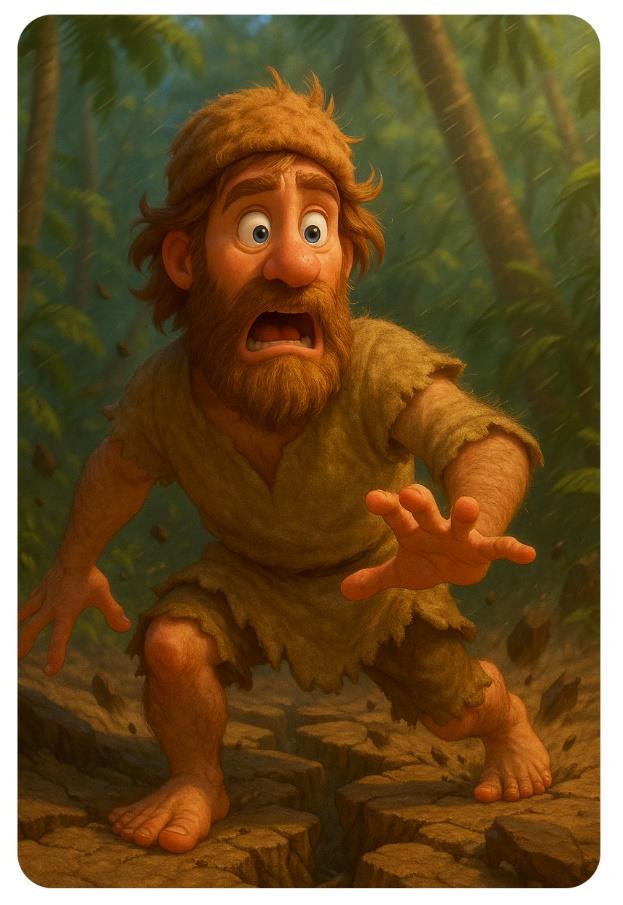
If just one of those rocks hit me or destroyed my home and garden, I would be lost!
QUESTIONS TO CONSIDER AS A FAMILY:
1. What was your favorite part of today’s reading? (Go around your group/family and have everyone retell their favorite part of this section of the story.)
2. Robinson believed that God used natural situations to teach lessons about his love and lordship. For example, God used a little goat with a broken leg to teach him how much God loved him. And, God used a moment in which Robinson was careless on his raft, tipping it over, to remind Robinson that he could not be too comfortable and that he needed to remain very careful of his surroundings in order to stay safe. God also used an earthquake to remind Robinson that He alone was most worthy of respect and fear. Have you ever experienced a hard, difficult, and scary moment that, in the end, God used to teach you something?
3. In Robinson’s story, there are many things that God provided so that Robinson would be able to care for himself. But, there were also other things that Robinson had to do in order to provide for himself. Can you give examples of things that God provided for Robinson? Can you give other examples of things that Robinson had to do for himself? In your own life, can you think of similar examples? What are two or three things that God has provided for you? What are two or three things that God has meant for you to do for yourself?
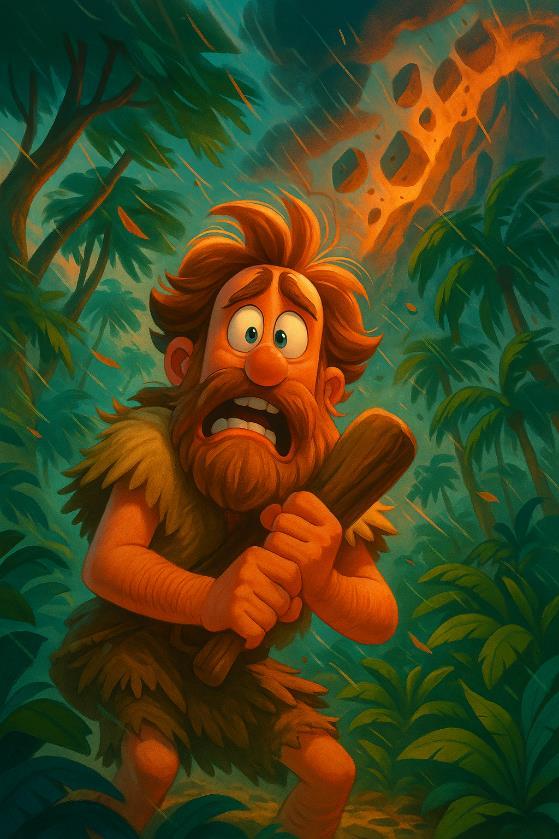
With the hurricane’s wind raging, the ocean’s waters leaping at me from beyond the beach, and huge stones striking the ground around me as if thrown by giants, I experienced fear like never before.
But, suddenly, I recognized that my life had been in God’s hands when He saved me from the shipwreck. I realized that if God had saved me then, He could save me now. So, I cried out to God, “Lord, please! Have mercy and give me wisdom! Allow me to survive!”
Immediately after my prayer, it occurred to me that the island’s higher ground would be safest. I grabbed my goat and ran as best I could over shaky ground up a path that led to the top of a hill overlooking my camp and the sea. Once I got there, I put the goat down and continued to pray, “Lord, thank you for that insight and directing my steps. I see that you care for me. And, in providing for my safety, I am learning day-by-day to trust you.” Here, the weather changed and the ground settled. The Providence of the moment was overwhelming and I fell to my knees in gratitude towards God.
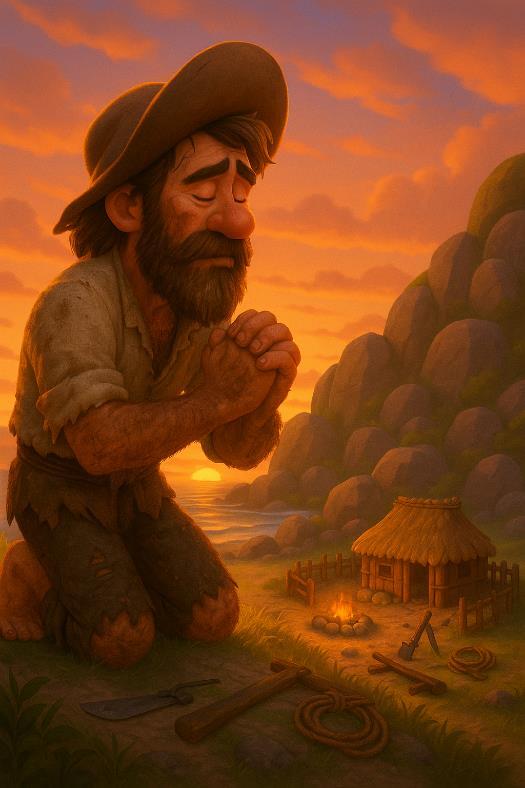
As I expressed thanks to God, my eyes fell upon my camp down below the hill. I realized in that moment that the falling stones had fallen around my home but never in it. And, one of the biggest stones had fallen upon the stream near my camp, damming up the flow of water so that it formed a little pond of completely fresh water.
Again, I could see that God was using my trials and tribulations to direct my path and preserve my life.
Next, I walked down to the beach during low tide. I saw something big on the shore it looked like a barrel that had washed up following the storm. When I got closer, I found it was a small barrel of gunpowder, but the water had ruined it. I moved it higher up the beach just in case it was still useful. Then I noticed the shipwreck looked different. The waves and wind had pushed it higher out of the water. I could now walk right up to it when the tide was out. Again, God was providing generously for me!
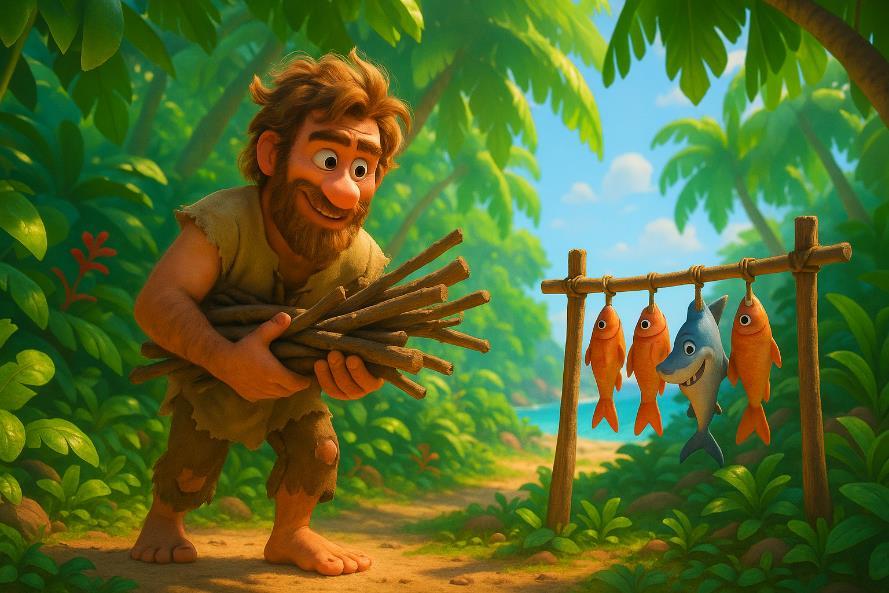
Over the next few days, I worked hard on the wreck. I cut beams, collected planks, and pulled out heavy pieces of iron. I used a crowbar to open parts of the ship and tried to reach inside for supplies. One day I even caught a small shark while fishing! I dried fish in the sun to save for later.
I kept working on the wreck every day when the tide was low. Mostly, I gathered wood because I thought I might be able to build a boat with all the materials, if only I knew how.
Several days later, I found a large turtle near the shore. It was the first turtle I had seen on the island. The meat was delicious, better than anything I had eaten since arriving.
But soon after, I got very sick. I began to feel cold and weak. Then a terrible fever hit me. I had headaches and chills and couldn’t sleep. After several miserable nights, and days that were useless for work, I was so scared and weak that I finally prayed to God. Even though I didn’t know what
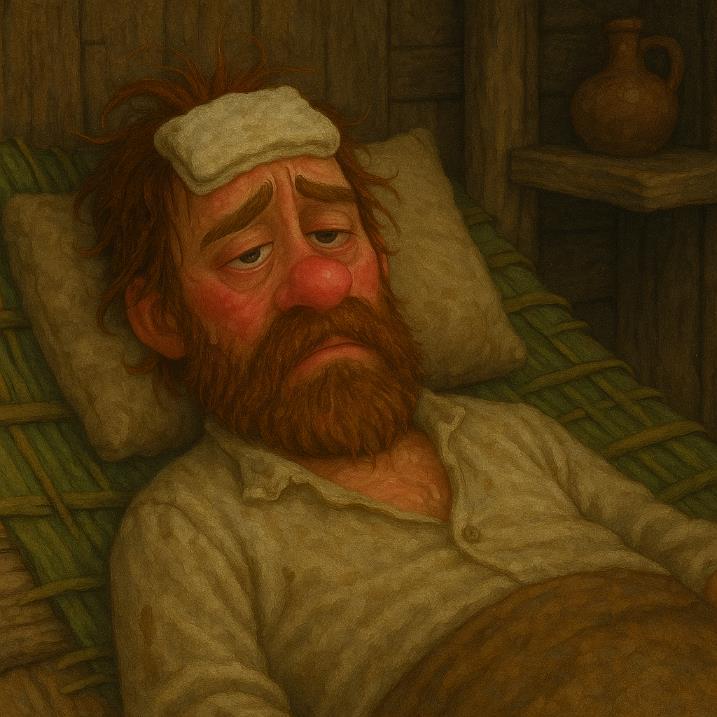
to say, I had never thought much about God before. But, now I felt desperate. I also recognized that I was quick to pray when trouble and danger presented themselves. But, when all was well, as it had been for many days since the hurricane and earthquake, I very rarely gave God any thought.
After these thoughts, I began to think deeply about my life. I remembered what my father had warned me: if I disobeyed, I would suffer. Now I felt it had come true. I was alone, sick, and scared, with no one to help me. I cried out to God in a way that I never had before.
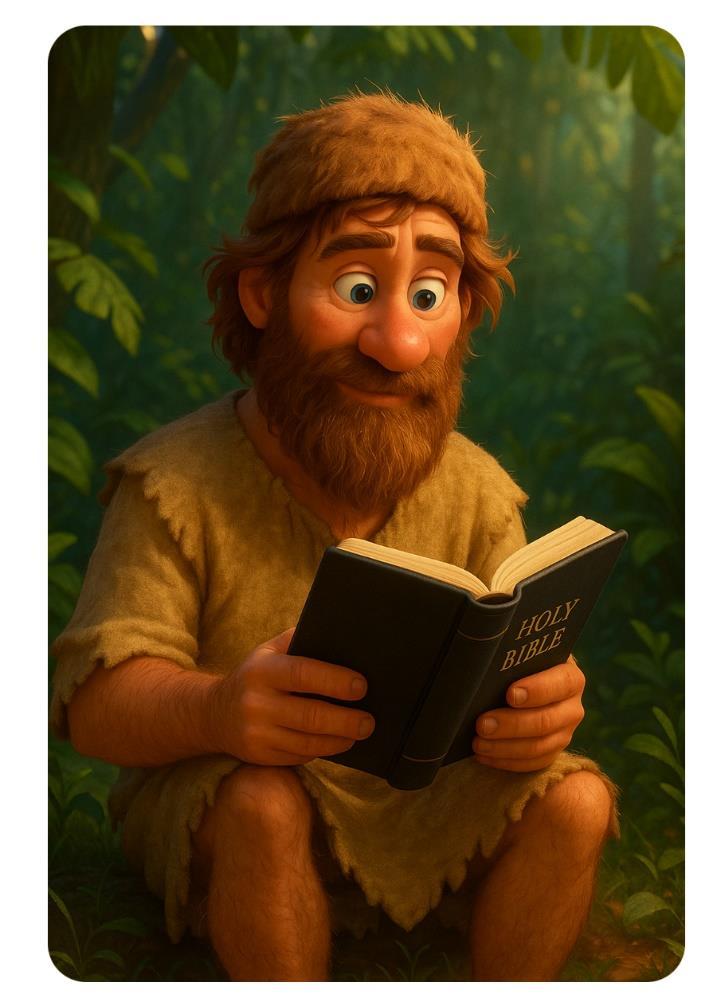
This was the moment when I truly began to think about my past choices and started to change.
After a week, I woke up feeling a little better, realizing that my fever was gone. Even though I was scared from a bad dream, I knew I had to prepare for the sickness coming back. I filled a bottle with water and put it by my bed. Then I cooked some meat, but I could barely eat it. That night, I roasted three turtle eggs and ate them, and for the first time, I prayed before eating. In my prayer, for the first time in my life, I did not ask God for anything. Instead, I simply thanked Him for all that He had done for me.
Later, I sat by the sea, still feeling weak from hunger and very sad. I started thinking: Who made the sea and land? Who made me? I realized it must be God. And if God made everything, then He knows about my troubles. Then, my heart reminded me of all the wrong things I had done in my life. I felt sorry and ashamed.
Soon after this moment, I walked back to my cave and lit a lamp. I couldn’t sleep, so I opened a chest I had saved from the shipwreck. Inside, I found a Bible that was still dry. I opened it and my eyes fell on a verse: "Call on Me in the day of trouble, and I will deliver you." That verse stuck with me.
That night, I did something I had never done I knelt and prayed, asking God to help me. Then I fell asleep and didn’t wake up until the next afternoon. When I did wake, I felt much stronger.
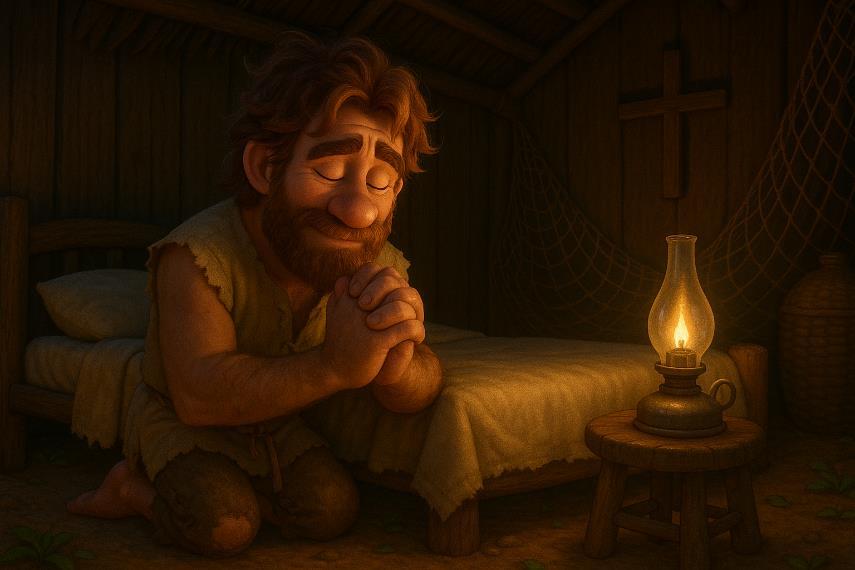
Over the next few days, I went outside again and ate turtle eggs. By the end of the week, the sickness was gone. I kept thinking about the verse I had read. I realized that even though I wasn’t rescued from the island, God had helped me recover. I prayed out loud, thanking Him for healing me.
On that day, I began to read the Bible more seriously and started doing it every day. I thought about all the bad things I had done before and asked Jesus to help me change. For the first time, I felt like I really prayed from my heart. I no longer cared as much about being stuck on the island. I just wanted to be free from guilt. I had peace inside because I was learning more about God and reading His Word.
Over the next several weeks, I slowly got stronger. I spent time walking with my gun and finding food. I explored the island more and found another, larger stream, fresh fruit, and wild grapes. I also found limes and lemons, which were healthy and tasty.
One night, I slept in a tree for safety and kept exploring the next day. I found even more fruit and planned to dry the grapes in the sun to keep as raisins for later. I went back home to get bags, but when I returned, wild animals had eaten my grapes! So I hung more up in the trees to dry.
Later, I thought about moving to the nicer part of the island, but I realized staying near the coast was smarter in case help eventually came. I still built a little shelter in this new, pretty area and called it my “country house.” I stayed there sometimes but kept my main home by the beach.
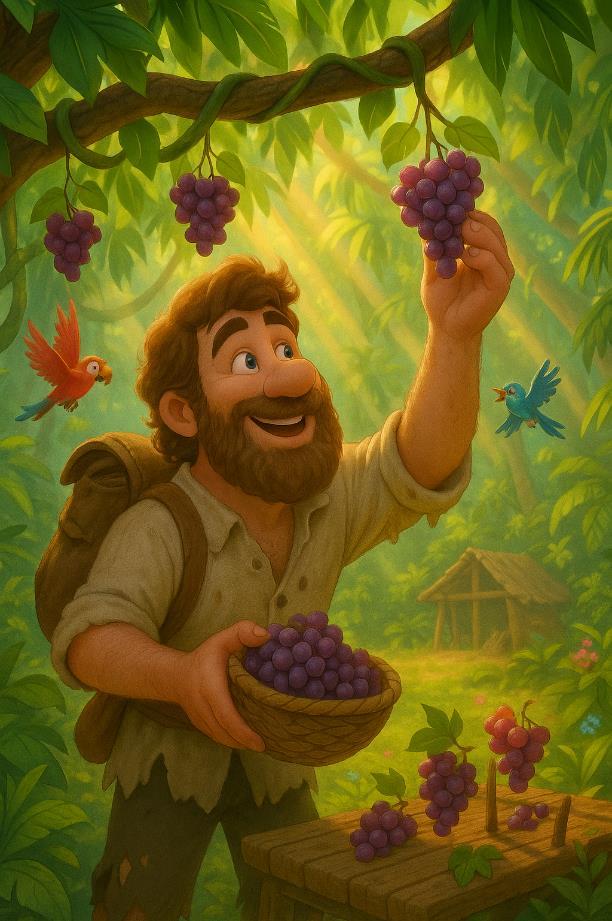
In August, the rain started, and I had to stay in my cave more. I used the time to dig and improve the cave. On September 30, I realized I had been on the island for a whole year. I made that day special by fasting, praying, and thanking God.
After this, I set aside one day each week as a Sabbath, though I wasn’t sure which day was truly Sunday. I learned from scripture that Sabbath was meant to be a day completely set aside for God. Because I obviously could not attend church, I chose to use this day to study and read the Bible more and to pray.
Later, I tried planting rice and barley, but my first try failed. I was glad I had saved some seeds. I tried again in a better spot, and the plants grew well during the rainy season.

I also noticed that the stakes I had used to build a fence had grown into small trees. I trimmed them, and they made a beautiful circle of shade. It gave me the idea to grow more trees as fences around my home.
By October, the rain came back, and I stayed mostly in my cave. I dried my grapes in time and stored them for food. My days were busy, and though I was still alone, I felt closer to God and more thankful.
I learned that my island didn’t really have summer and winter. Instead, it had a rainy season and a dry season. The rain sometimes lasted a long time, so I made sure to gather food and supplies before it came. When it rained, I stayed indoors as much as I could.
During those rainy months, I stayed busy. One big challenge was trying to make baskets. The twigs I found at first were too brittle, but I remembered how I used to watch a basket-maker when I was a kid. Using that memory, I tried different twigs until I found the right kind from a nearby tree. I dried them out and made baskets for carrying dirt, storing food, and even holding corn. They weren’t perfect, but they worked well.
Once I had made enough baskets and supplies, I decided to explore more of the island. I packed my gun, a hatchet, my dog, and food, and set out toward the west. When I reached the other side of the island, I saw land far away maybe another island or the
coast of America. It was likely part of the Spanish colonies, which could mean it was home to unfriendly people, savages that did harm to explorers and sailors. So I decided to stay safe where I was and trust that God had placed me here for a reason.
This part of the island was more beautiful than where I lived. It had grassy fields, lots of colorful flowers, and many birds, especially parrots. I caught one young parrot and eventually taught it to say my name. I also saw animals that looked like hares and foxes, but I didn’t try to eat them since I had plenty of good food like goats, pigeons, turtles, and grapes.
Each day, I only traveled about two miles. At night, I either slept in a tree or built a small fence of sticks to protect myself from animals. When I reached the beach, I realized it had way more turtles than the side where I lived. There were also many birds I hadn’t seen before, some of them were very tasty.

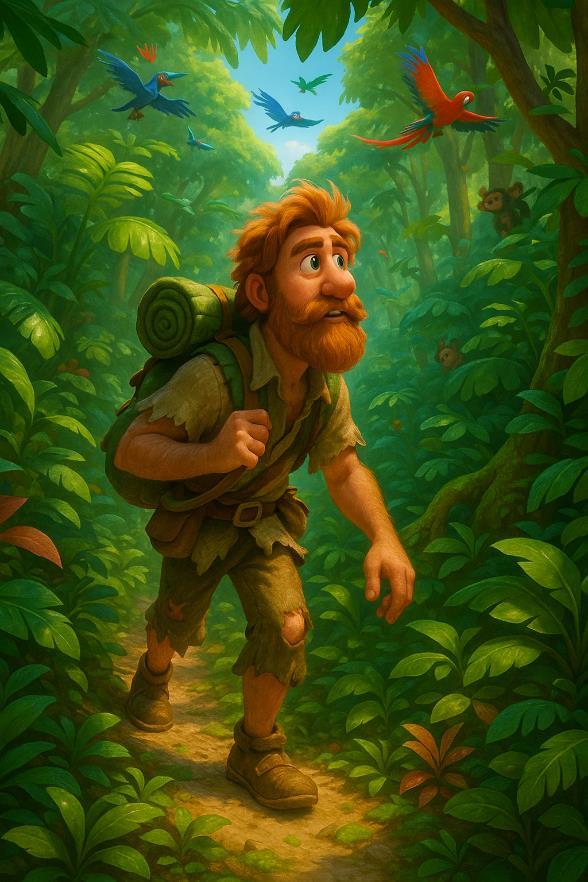
I was careful not to use too much gunpowder, so I mostly hunted goats. This side of the island had more goats, but they were harder to catch because the land was flat, and they saw me coming from far away. Even though this side was nicer, I didn’t want to move. My home felt right, and being away from it felt strange.
I continued east along the shore for about twelve miles, then put up a tall stick as a marker and started heading back. I tried to take a different route, thinking I could find my home easily, but I got lost in a big valley with hills and trees all around. It was cloudy for days, so I couldn’t use the sun to guide me. Eventually, I found the beach again, saw my marker, and followed the same path back home. It was a hot and tiring trip, but I made it safely.
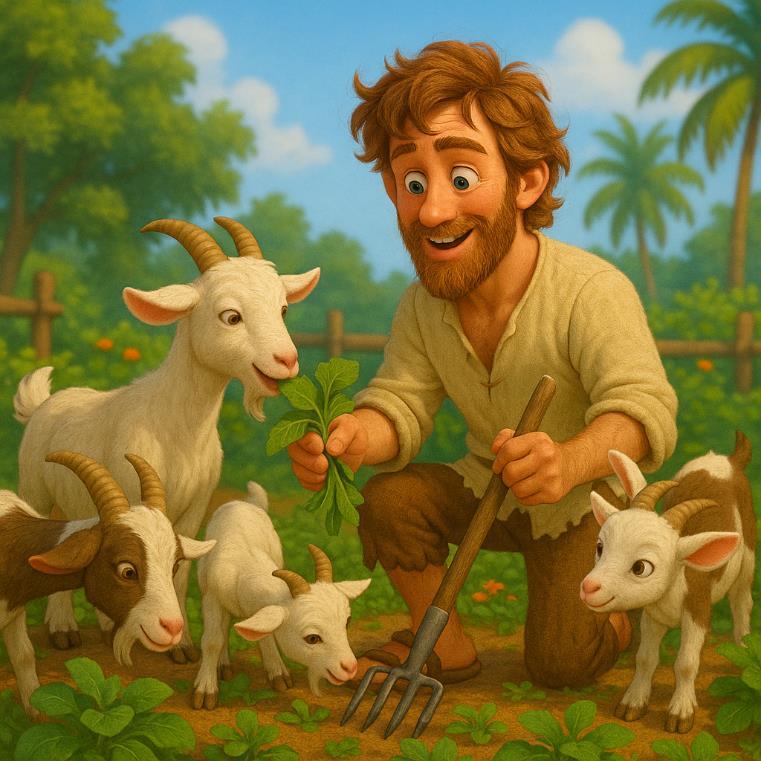
While I was walking with my dog, he suddenly chased a baby goat, or kid. I ran after them and grabbed the kid just in time to save it. I thought, “What if I could tame goats and raise them? Then I could have meat when I run out of gunpowder.” I made a little rope and collar and led the kid back to a small shelter I had built earlier. Then I hurried home I hadn’t been back in over a month!
It felt amazing to lie down in my hammock again. After all the traveling, being in my own home felt safe and peaceful. I stayed there for a week, resting and building a cage for my parrot, Poll, who had become very friendly.
Then I remembered the poor baby goat I had left behind. I returned and found him hungry and weak. I fed him branches and shrubs, and when I was ready to leave, he followed me like a puppy. He became another one of my pets and never left my side again.
By now, it was September 30—two years since I had landed on the island. I spent the day praying and thanking God for helping me. Even though I was alone, I started to feel more thankful and closer to God than I had ever felt when I lived with other people.
In the past, I used to cry and feel trapped when I thought about my lonely life. But now, I started to read the Bible every day. One morning, when I was sad, I opened to the words: "I will never leave you nor forsake you." That felt like God was talking right to me. It gave me hope.
I realized something amazing: even though I was alone on this island, I could still be happy. I didn’t need everything I used to want God’s presence was enough. I wasn’t
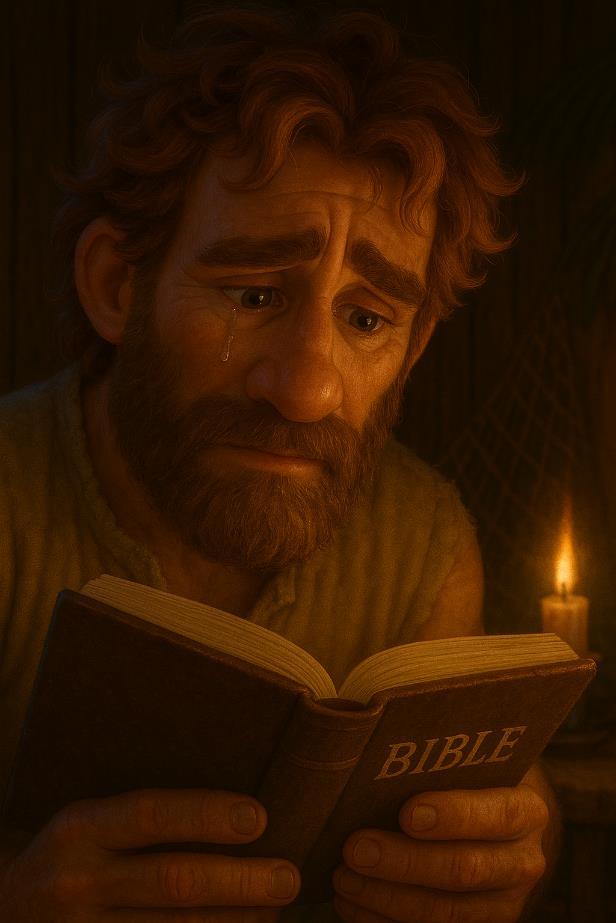
quite ready to say, “Thank you for bringing me here,” but I could thank Him for changing my heart.
QUESTIONS TO CONSIDER AS A FAMILY:
1. Among the many mercies that God shows Robinson are the several animal friends that he makes. These animals become his pets but they also become a real source of companionship to him. What does this tell you about the way that God has made us?
2. Although Robinson is growing closer to God over time, his difficulties and trials continue. As Christ followers, will our lives ever be completely free of trouble? Why is this?
3. Over time, Robinson’s prayers begin to change. At first, he only prays when he is in trouble and when he needs something from God. But, that changes. How do his prayers become different? Why do his prayers change?
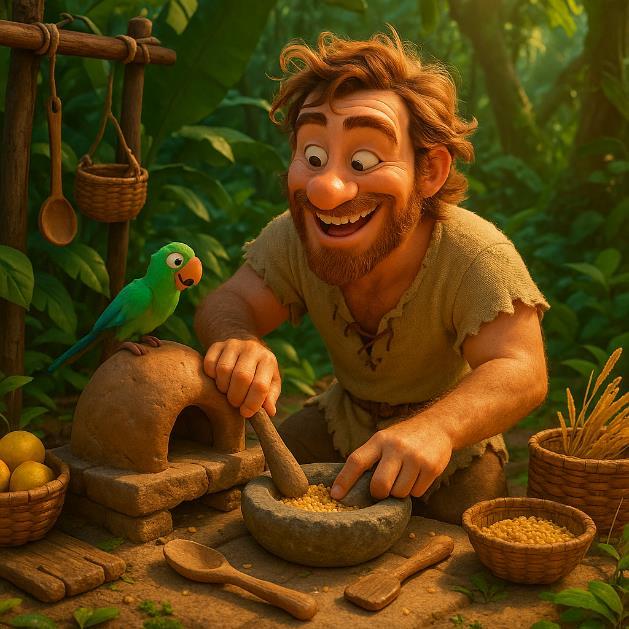
I started my third year on the island with a new attitude. I spent every day doing certain jobs: reading the Bible, hunting for food with my gun, cooking and preparing food, and doing chores around my home. The sun was too hot during the middle of the day, so I worked in the mornings and evenings. Everything took a long time because I didn’t have the right tools, and I had to make everything by hand.
Still, I had a problem: I didn’t know how to grind the grain into flour, or bake it into bread. So I decided to save all the grain for planting next season. In the meantime, I worked hard every day to figure out how to make tools and supplies for baking bread in the future.
It was hard work, but it gave me hope. And even though everything was slower and harder than it would have been in England, I knew that, with patience and God’s help, I would figure it all out. And, to be completely honest, I discovered that I really and truly enjoyed doing many of my tasks in a simpler, more basic fashion. Though I lacked tools that made work easy, there was a real satisfaction in hard work and using my mind figure things out.
Even while I was building and fixing things, I kept thinking about the land I saw far across the water. I imagined it was full of people and I dreamed of escaping to it. I also realized that it might be dangerous. What if there were wild people there people worse than lions or tigers? Still, I couldn't stop thinking about finding a way off the island.

To get to that island, I thought maybe I could fix the ship’s boat that had been washed up when we first crashed. But it was turned over and half buried in the sand. I tried
everything cutting wood, digging, using rollers but I just wasn’t strong enough to fix it or move it to the water.

So I had a new idea: I would build a canoe from a giant tree, just like the natives in other lands did. I found a huge cedar tree and started cutting it down. It took me 20 days to chop it and many more days to cut off the branches. Then I worked for months shaping it into a canoe and hollowing it out with my tools. In the end, it was a beautiful, strong boat big enough to carry over twenty people!
But there was a problem. I had built the canoe far from the water, and it was way too heavy for me to move. I dug the ground to make a slope and even tried to dig a canal to bring the water to the canoe. But it would have taken me over ten years to finish, and I gave up. I learned the hard way not to start big plans without thinking them through.
Even though I failed, I felt more at peace. I started to enjoy the quiet life. I had everything I needed—food, water, and safety. I realized that having more stuff didn’t mean more happiness. I had money from the shipwreck, but it was useless here!
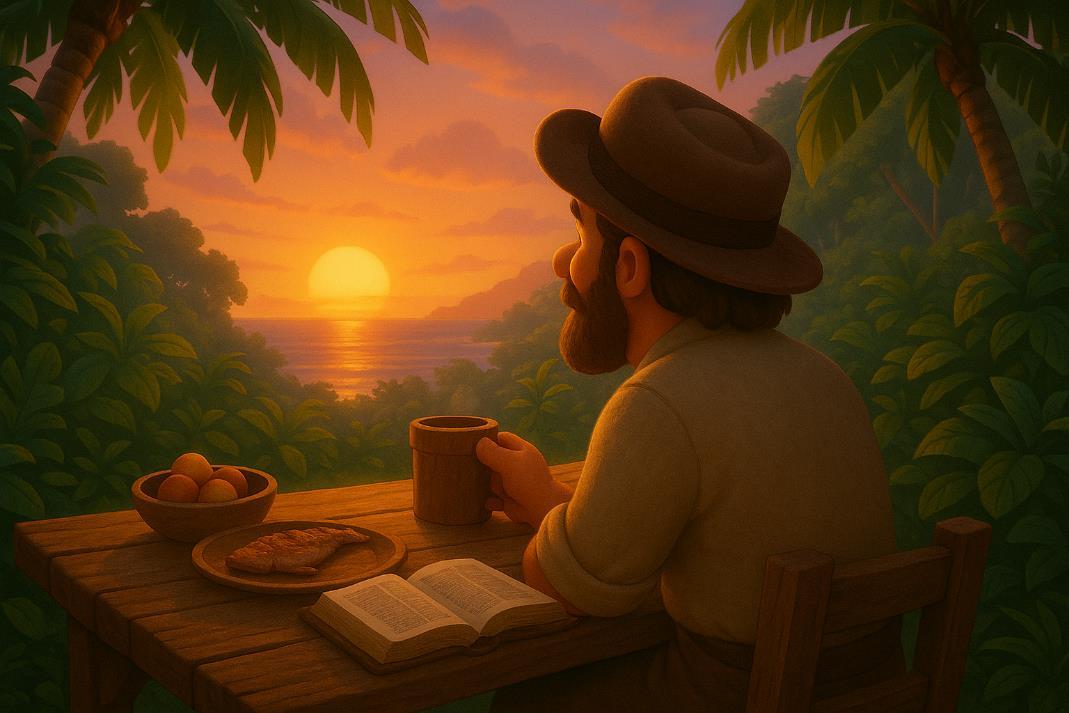
I thought more about God and how thankful I was to be alive. I continued my daily time of prayer and reading the Bible. I started to look at the good side of my life, not just the bad. I realized I could have died in the storm or starved without the supplies I rescued from the ship. That made me feel blessed and thankful.
After four years on the island, I marked the anniversary with prayer. I had changed a lot. I no longer cared about the world I had left behind. I saw it like a dream from long ago. I had food, shelter, and peace. I even made myself clothes from animal skins and a big hat to keep off the rain. I made an umbrella too—it took forever, but it worked.
Even though I was alone, I didn’t feel lonely all the time. I talked to God and found comfort in my thoughts. Life was hard, but it was also full of small blessings. I learned that being thankful for what you have is more important than wanting things you don’t.
One afternoon, while walking near my boat, feeling very content, I saw something that shocked me. It was the footprint of a person in the sand. This was something I never expected! It was very clear, and I could see the toes and heel. I looked all around but didn’t see anyone. I even climbed a hill to look farther, but there were no more prints. I couldn’t explain it. My heart pounded, and I rushed back to my home, terrified. Every tree looked like a person in the jungle shadows, and I imagined I was being followed.
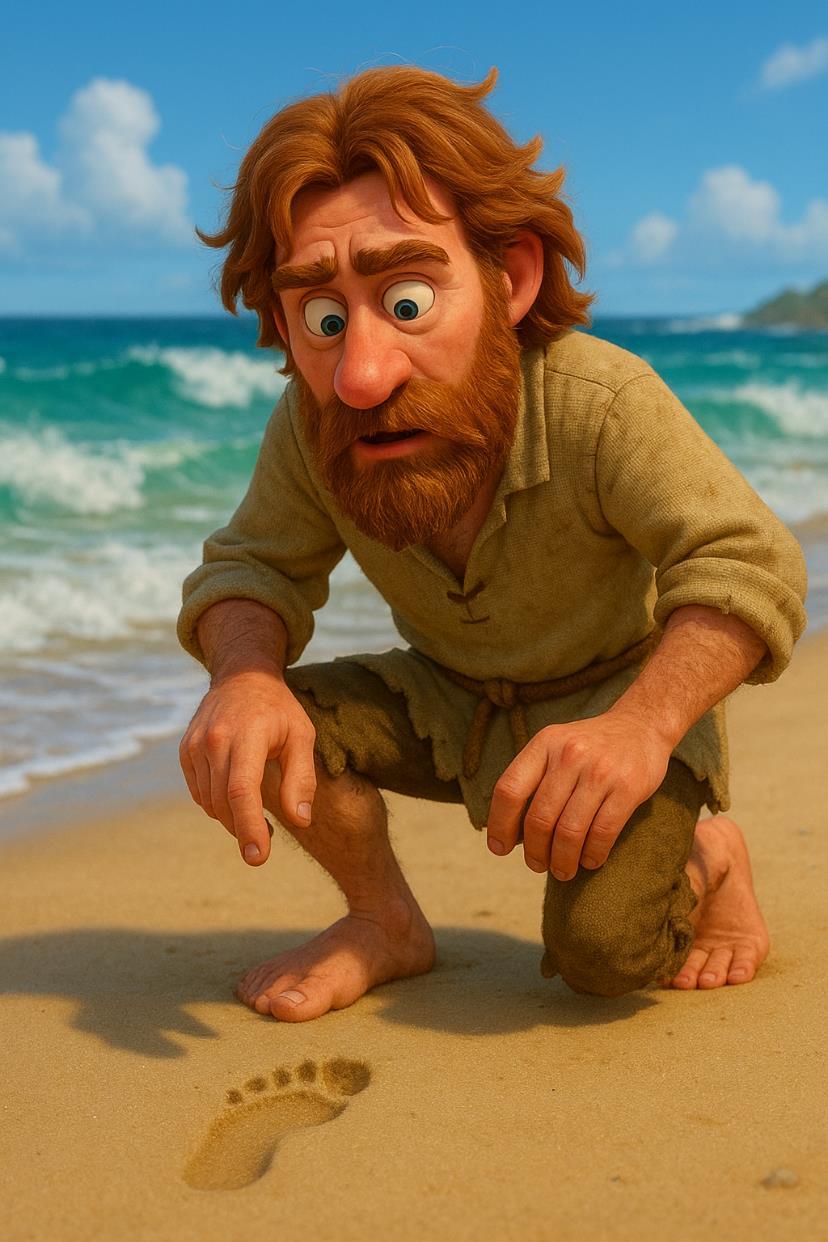
That night, I couldn’t sleep. I was scared the person might come back. At first, I even wondered if it could be the devil! But then I thought that was silly. It made more sense that someone from the mainland had come in a canoe, maybe by accident, and then left again. I was glad I wasn’t there when they arrived and hoped they hadn’t found my boat or camp.
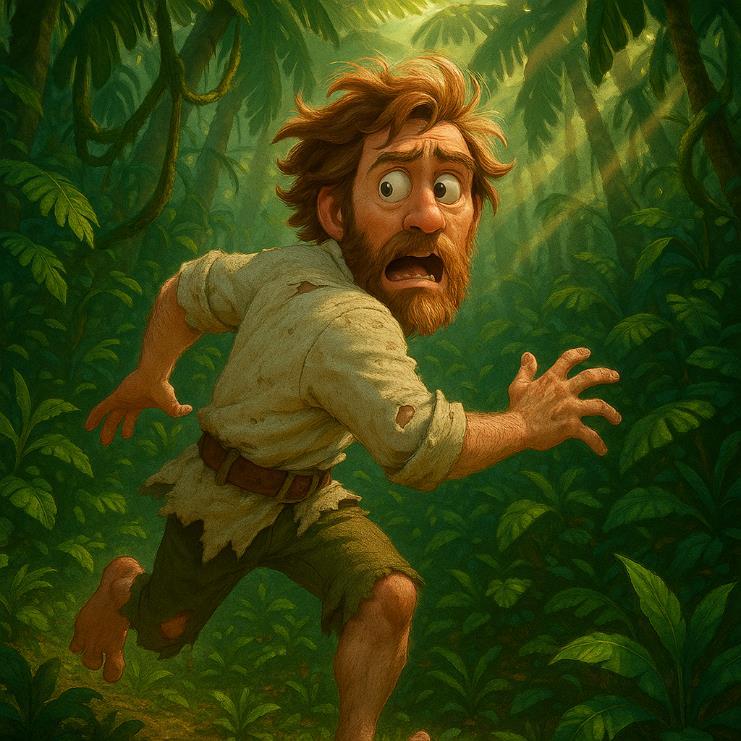
Still, I was filled with fear. I had trusted God to protect me before, but now I felt even more alone and scared. I wished I had planted more corn, just in case I had to hide for a long time. I promised myself I’d grow enough food for several years, just to be safe.
It was strange—I used to be sad because I was all alone and wished to see another person. But now, the idea of someone else being on the island made me more afraid than ever.
I tried to calm myself by thinking about God. One morning, while I was praying and reading the Bible, I came across a verse: “Call on Me in the day of trouble, and I will deliver you.” Then I read, “Wait on the Lord… He shall strengthen your heart.” These verses gave me peace, and I wasn’t as afraid anymore.
For a moment, I thought maybe the footprint was actually my own, left from a different day. That gave me hope. I left my house to go milk my goats, but I was still very nervous. I kept looking over my shoulder, scared something or someone was watching me.
After a few days of seeing nothing unusual, one day at sunset, I built up the courage to return to the beach. I checked the footprint again and compared it to my own. But it was much bigger than mine. That scared me all over again! I now believed someone else really had been on the island. I worried about what they might do if they came back.
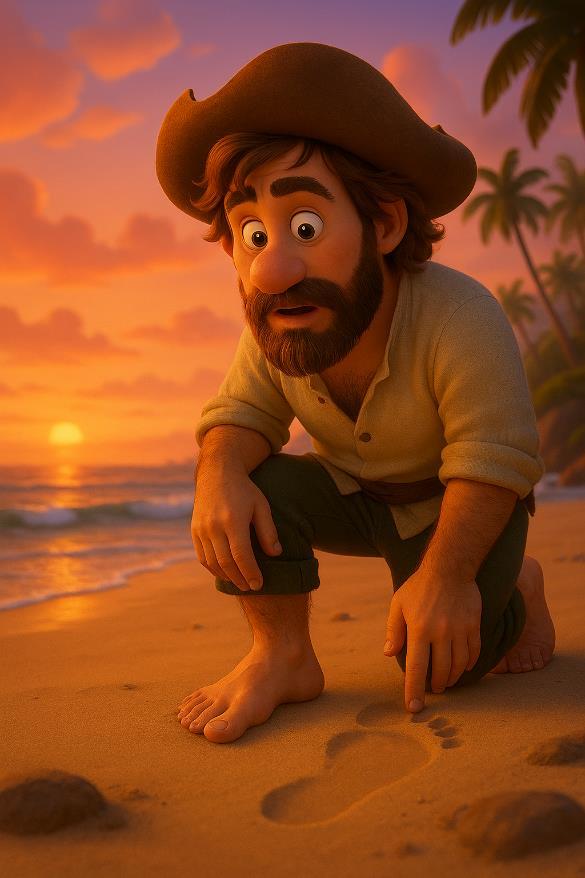
I made a plan. I would hide my goats so that no one could steal them. I even thought about tearing down my camp to hide all signs that anyone lived there. Instead, I built a second wall around my home and made it strong, with sticks, old ropes, and even holes to put my muskets through in case I needed to defend myself.
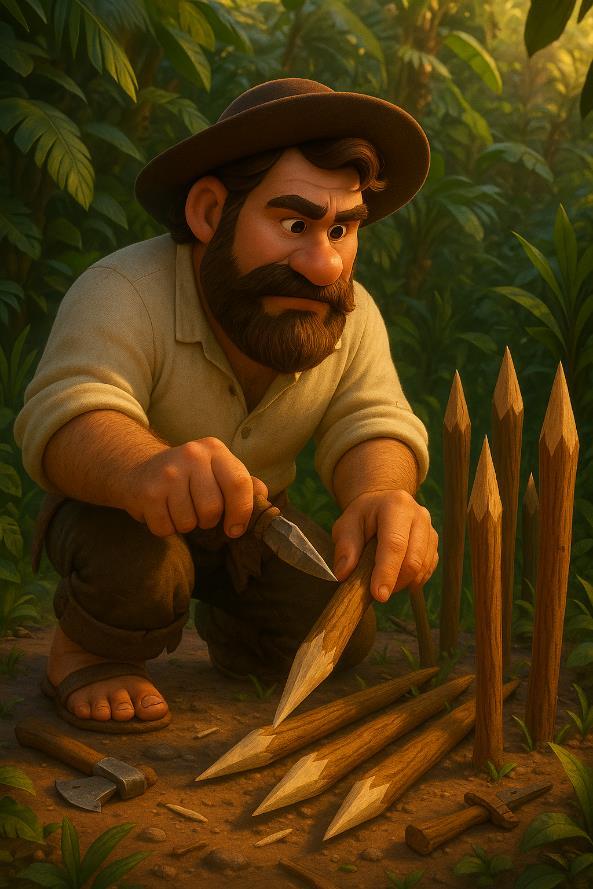
Outside this wall, I planted tons of sharp sticks and fast-growing trees so that it would be almost impossible for anyone to see my home from a distance.
I dug holes in the ground and covered them with branches. These would serve to capture someone approaching. I also tied thin strands of rope to the base of trees so that if anyone was approaching, they might trip and make enough noise to alert me.
I had heard the stories of native tribes in this part of the world. I knew that they were dangerous. The stories called these people “head hunters” and worse.
And, now, I worried that the danger had found me.
QUESTIONS TO CONSIDER AS A FAMILY:
1. Robinson makes an interesting observation about money. He realizes that he has plenty of it but that it has no value to him on the island. Why is that the case?
2. Robinson finds that he has learned to be content. What does it mean to be “content”?
3. In Philippians 4, the Apostle Paul writes, “Not that I am speaking of being in need, for I have learned in whatever situation I am to be content. I know how to be brought low, and I know how to abound. In any and every circumstance, I have learned the secret of facing plenty and hunger, abundance and need. I can do all things through him who strengthens me.” Does this apply to Robinson’s situation? Does it apply to your situation?
Finally, after several days of hard work, I recognized that I had built fences, put out traps, and had done enough to protect my home, my animals, and myself. Nevertheless, even though I hadn’t seen anyone else, I still lived in fear of the person to whom that mysterious footprint belonged I prayed to God, but my fear often made it hard to feel peace.

Several days later, I was hiking in the hills above my camp, exploring a new part of the island. The sea was hazy but I continued to look out over the water for any sign of danger.
Then, I found what I had been looking for…a boat seemed to be leaving the island. But it was a great distance from the island and with the haze and without my telescope, I could not be sure.
Slowly, I made my way down the slope of the hill, working to conceal myself behind bushes and trees so that I could not be seen.
As I moved closer to the shore, my heart stopped in my chest. I saw the remains of a campfire. I found signs that many men had been there. I was shocked to see bones and ashes, the remains of a meal. There were many footprints in the sand, all of the size that I had spotted earlier. I realized that my island was being visited.
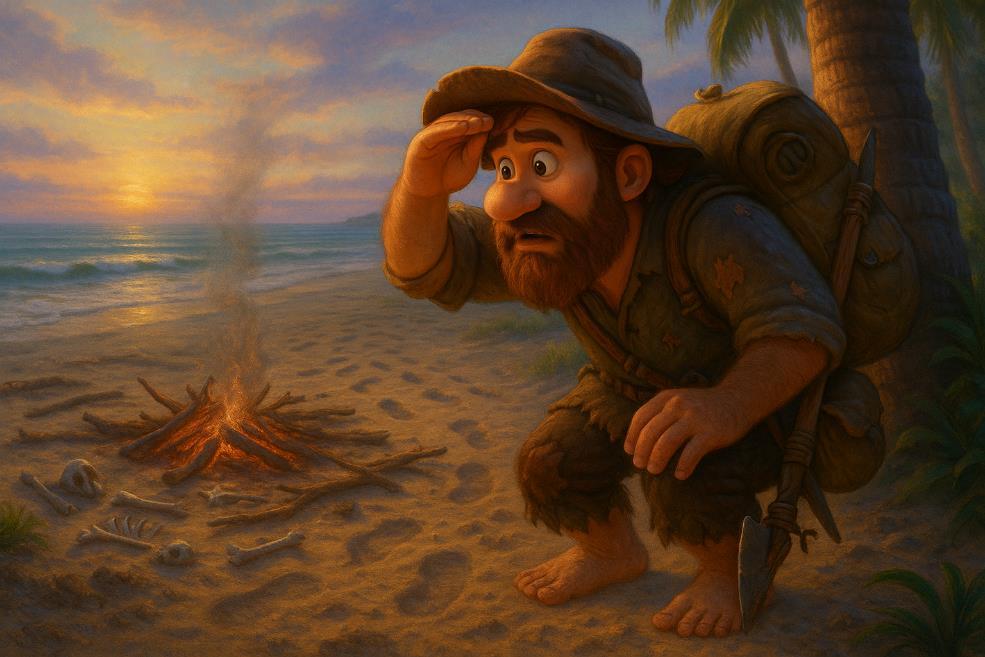
For many weeks, I stayed hidden and kept watch, hoping to avoid being discovered. I stopped using my gun and did everything quietly. I even made a new emergency cave where I could keep my gunpowder safe and hide if needed.
One morning, as I was walking quietly through the jungle, I spotted a steady flow of smoke rising from a distant beach. I crawled on my knees and approached the beach. Once I was there, I remained very still and even tried to slow down my breathing. I saw a fire on the shore.
What I saw next changed everything.
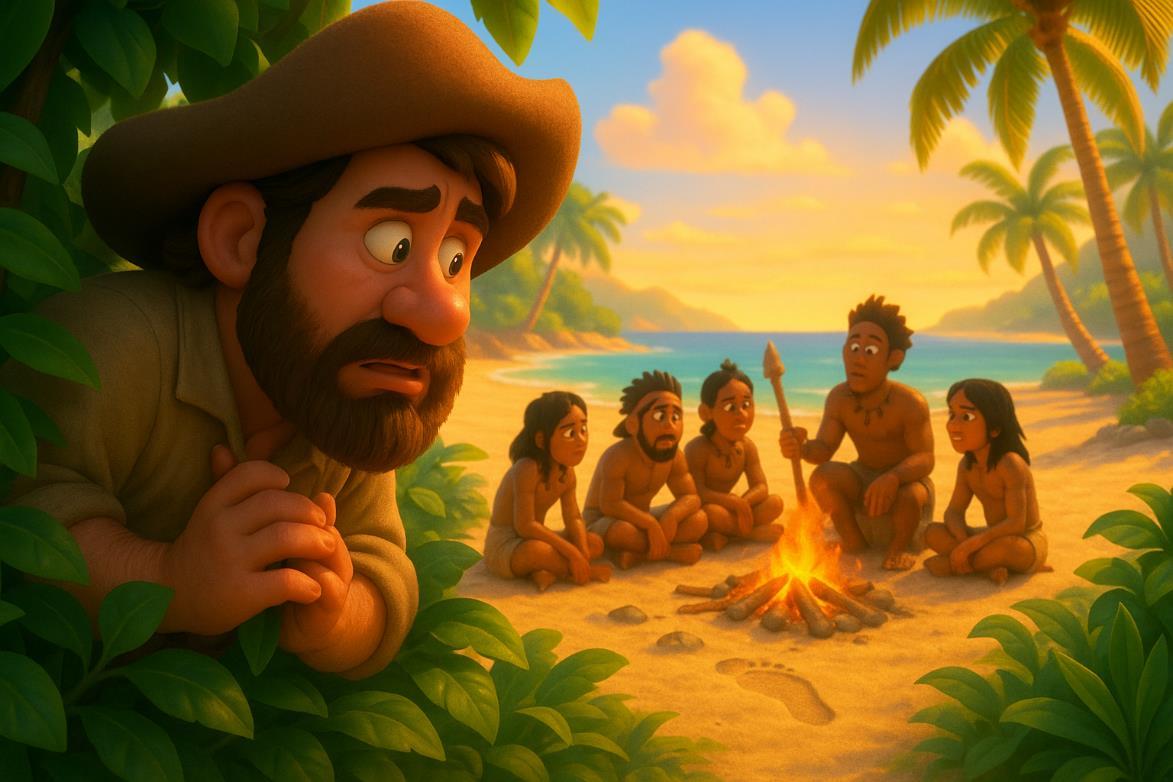
There, gathered around the fire, were several savages. They had brought prisoners and were treating them very roughly I felt both afraid for the prisoners and angry that one man would treat another so poorly. The savages ate the portion of meat that they had brought and threw the bones to the prisoners. The natives laughed as, with hands tied behind their backs, the prisoners attempted to eat the scraps.
I watched for about an hour. This was the first sight of men that I had enjoyed in a long time.
Eventually, the tide started to rise. The savages grabbed their prisoners and shoved them back into the boats. Then, they paddled back out to the sea. When they were far enough away, I visited the spot. I found the remains of the poor goat that the savages had killed for food. Even though I had the meat from many goats, this made me sad. I buried the goat and said a prayer for it. This brought me some comfort.
Time passed, and I often imagined plans to scare away or harm the savages. But I realized it wasn’t my place to judge them. I recognized that I did not understand the story of the savages or their prisoners. I did not have enough information to understand who was good and who was bad. I prayed for wisdom and decided to only defend myself if I was attacked.

About a week later, as I walked the shoreline, from a distance I spotted five canoes and many savages on my side of the island. Before, these visiting savages had been far and away, on a different part of the island. But, now things had changed. These boats were on a beach not far from my camp.
I stayed hidden, afraid they might find me. Because I knew this area so well, it was easy to hide. I watched the group from a distance and saw them dancing around a fire. Then, two prisoners were brought out. The savages pulled out long swords and I knew that something bad was about to happen.
But, in that moment, one of the prisoners suddenly rammed his captors with his body, knocking them to the ground. Then, he ran away. H was heading in my direction!
The other prisoner had an injured leg and could not break free from the savages holding him.
I watched as three men chased the runner. He ran fast, swam across a creek, and kept going. I decided this was the moment to help. I ran down with my weapons and jumped out of the jungle in front of the savages. They stopped in their tracks. At first they were startled. Then, they faces became afraid. I realized how scary I probably looked after living alone for so long on this island.
After moment, they overcame their fear and raised their swords. I fired my gun into the air. The flame, the smoke, and the noise shocked them. I used the moment well. I hit
one them with the butt of my gun. He fell unconscious to the ground. The two others turned and ran.

The man that they had been chasing began to run back in the direction from which he had come. He was headed back to danger! I called to the fleeing man and showed him I was a friend.
He slowly approached me, kneeling and showing thanks. I gave him food and water. He was very thirsty. I could tell that the savages had treated him poorly. He had many bruises and cuts. Deciding that he needed to be cared for, I returned with him to my camp. I washed his cuts and wrapped them with bandages. I gave him some tea and this revived him. I prepared a place for him to lie down where he slept for several hours.
When he woke, he acted as though he would leave but I asked him to stay with me. I named him Friday, because it was Friday when I saved him. Over the course of several days, I taught him to speak some English and treated him kindly. I gave Friday clothes and as much food as he needed
I showed him my rifles, something that he had never seen before. At first, when I fired the gun at a bird in a tree, his old fear returned. I could tell that he considered running away. But, I put my hand on his shoulder and smiled. I held the gun out to his trembling hands. I taught him how to use it and, after an afternoon of practice, he became an excellent shot.
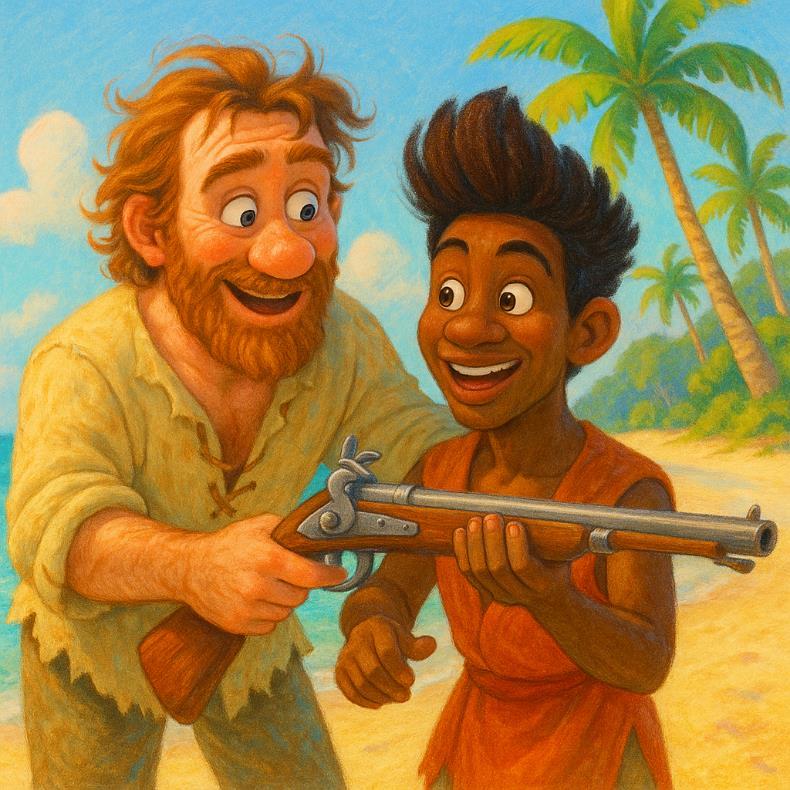
We went back to the spot where he had been captured and cleaned up the horrible mess. Friday helped gather and burn what remained of the mess that the savages had left.
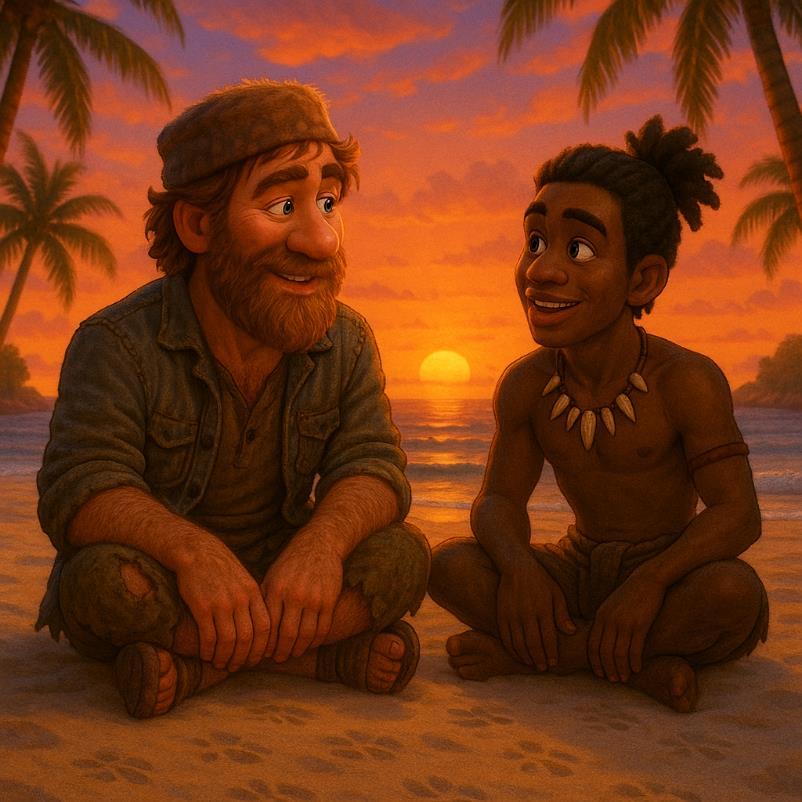
I built a tent for him near my own shelter and felt safe having him close. Friday was loyal and kind. I taught him many things, and he learned quickly. I began to feel less lonely. I realized that even though Friday came from a different culture, he was just as capable of kindness, love, and learning. I thanked God for sending me a friend.
Now with a true companion, my life on the island became better. I found comfort in Friday’s friendship and God's protection. But, I was not a fool. With each passing week, the savages had been coming closer and closer to my home.
And, on the day that I had rescued Friday, the three savages that had pursued him had seen me. They knew that I was here. I knew that they would be back.
QUESTIONS TO CONSIDER AS A FAMILY:
1. So far in our story, we have seen that God has used trials and difficult situations to teach things to Robinson. God uses the hard times to grow us. In this section of our story, Robinson realizes he is at risk from savages. What do you think that God is trying to teach Robinson?
2. Robinson decides not to hurt any of the savages unless they first attempt to hurt him. Do you think that is wise? Why or why not?
3. Friday becomes Robinson’s friend in much the same way that we have seen Robinson become God’s friend. Do you see any similarities in the friendships between Robinson/Friday and God/Robinson?
4. What do you think might happen next?
After Friday and I had been back at my shelter for a few days, I decided it was time to teach Friday how to hunt. One morning, I took him with me into the woods. I wanted to get a goat from my herd for us to eat. As we walked, I saw three goats resting in the shade. I told Friday to stand still. Then I aimed my gun and shot at them.
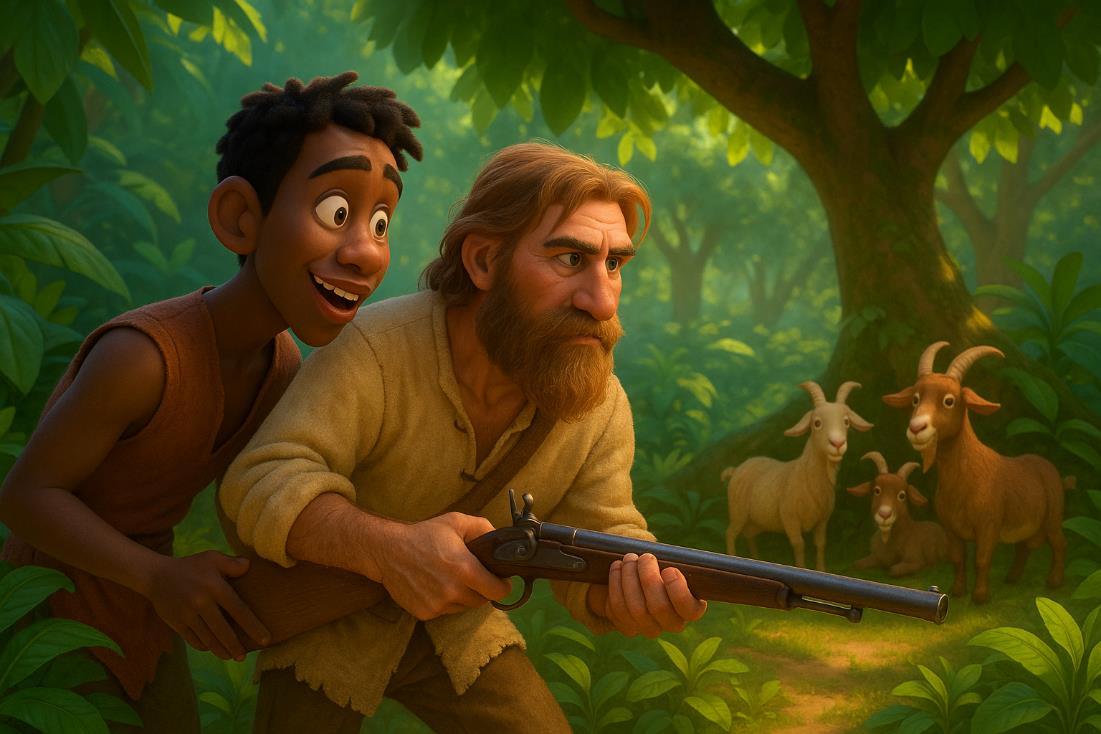
When he saw what happened to the goat, he was very scared and shook all over. He looked like he thought I was going to shoot him next! He even opened his shirt to see if he was hurt. Then he dropped to his knees and hugged my legs, talking fast in words I didn’t understand. But I knew he was begging me not to hurt him.
I realized that I had taught Friday about the rifle and about how it worked. But, I did not teach Friday what it could do. More importantly, I recognized that I did not teach Friday why a rifle was useful and that a gun could be used for both good and evil. I laughed, picked him up, and showed him the goat I had shot. I pointed to it so that we could go get it. He ran to it first and picked it up, looking at it closely. While he was busy, I quietly reloaded my gun. Then I saw a big bird sitting in a tree. I pointed at it and showed Friday that I was going to shoot it too. It was really a parrot, though I first thought it was a hawk.
I fired the gun and the bird fell. Friday looked shocked again. At first, I believed that his shock was because he couldn’t believe I could make animals fall from far away.
He went to find the bird, which had fluttered away a bit before dying. He brought it back to me. I saw in his eyes that it was not the gun that had troubled Friday. It was the idea of death that troubled him. To be sure, Friday understood that things died. His tribe had obviously been at war with another tribe when I rescued him. But, when he saw the fluttering bird as it was dying, it made him sad.
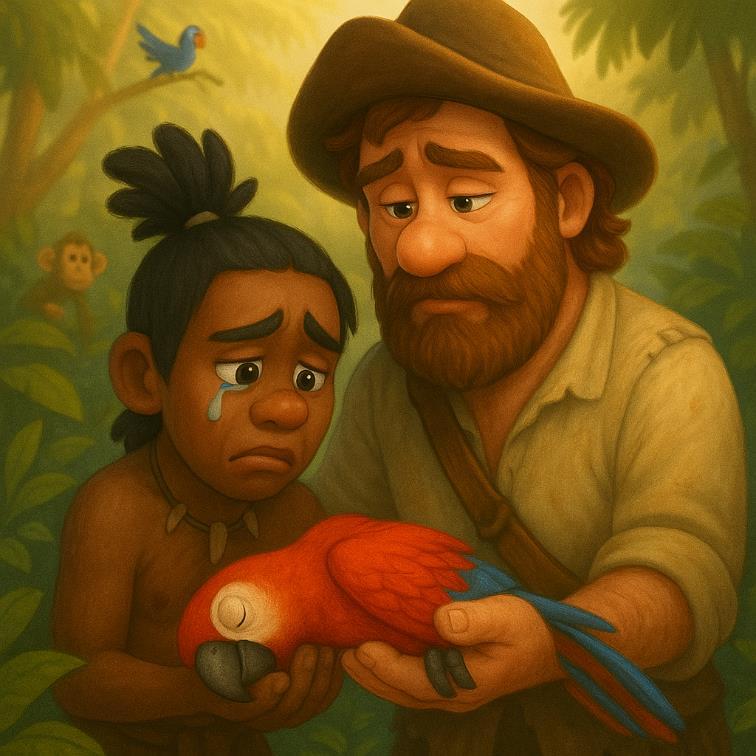
That evening, I skinned and cut up the goat. I made a stew with the meat and gave some to Friday. He liked it a lot. But he thought the salt I added was strange. When he tasted it, he spit it out and rinsed his mouth with water! I tried to joke and eat mine without salt, pretending to spit too, but he still didn’t like it.
The next day, I roasted some goat meat over the fire. Friday loved it and told me in many ways how good it tasted. I was glad he liked it. We talked about the fact that God had provided the goat so that we could eat. I explained that I did not enjoy killing animals. I told him that killing an animal simply for the sake of ending its life was bad but that hunting which provided food was good. I also explained that ending the lives of men was never good. There were reasons that it had to happen at times but, even in those necessary but horrible instances, it should make us sad when it had to happen
Soon, Friday helped with grinding corn and baking bread. He learned fast and worked hard. He even helped plant more crops, since we needed more food for both of us.

A full year passed and it was the best year I’d had on the island. Friday learned more English, and we could talk. He was honest and kind, and I began to realize that he was the closest friend I ever had. He seemed to feel the same about me.
One day, during that year, as we were going out hunting again, I asked him about his old life. I wanted to know if he missed his people or ever thought about going back. He said his people had once taken prisoners when they had no boats to flee or weapons to fight back. I also asked him what happened to the prisoners they took. He said his people usually killed them or took them far away. Once more, I could see that the idea of killing and hurting someone else was bothering him significantly.
We talked more about the lands nearby. Friday told me that beyond the sea, his people lived on a big island called Trinidad. He said there were also white men with beards who had come to their land long ago and hurt many people. I believed he meant the Spanish explorers that I knew had explored this area of the world. He said that some of the natives had killed a few of the Spanish men. Again, this thought bothered him.
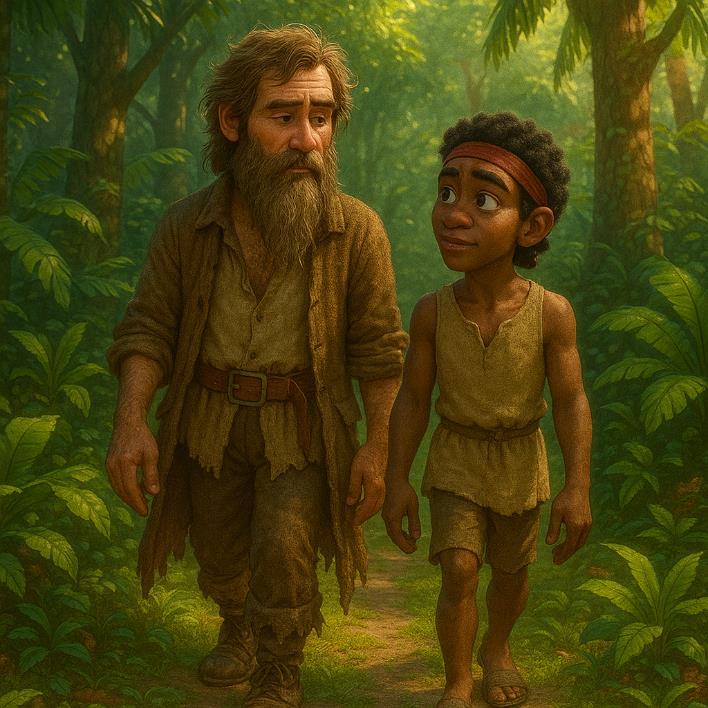

I asked him about death and what he thought happened to people after they died. We started talking about God. Friday didn’t know who made the world, so I taught him about the one true God and about Jesus, God’s Son I explained that God had sent Jesus to the world and that Jesus had done many good things for men, women, and children. I wanted Friday to know that God sent Jesus because He loved us. The thought that God loved us enough to send His own Son surprised Friday. Friday told me that the gods of the natives were said to be angry and vengeful. The natives felt that they had to make sacrifices and do good deeds to appease their gods.
We talked about good and evil. We spoke about good decisions and bad decisions. I explained that sin is what separates us from our loving God and that, on our own, we
could never be good. He listened closely and I could tell what he heard was really hitting home.
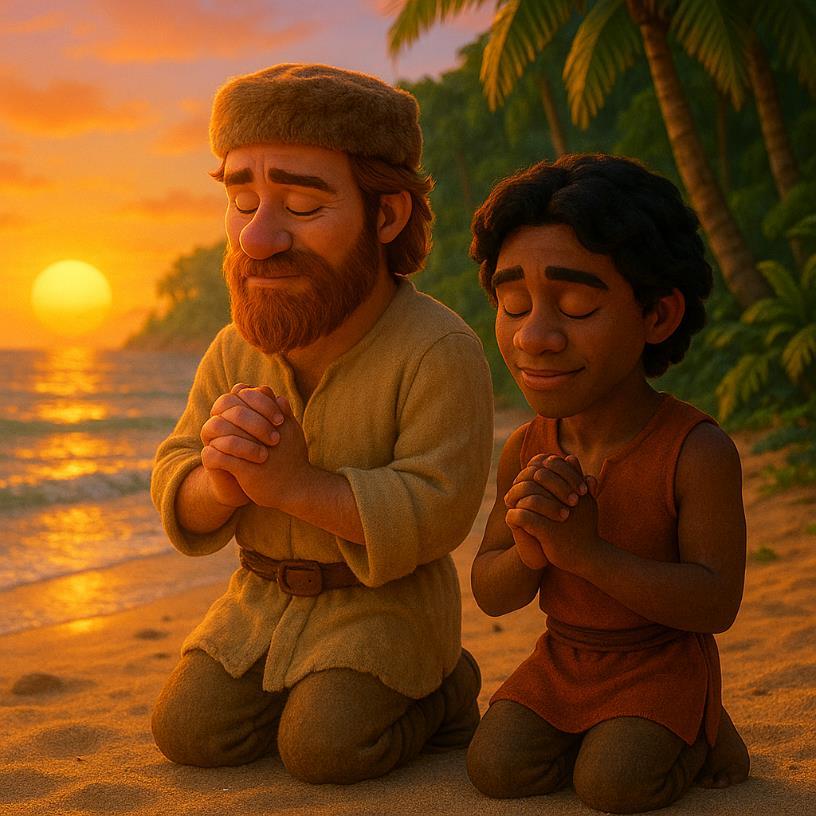
When I told him about the devil, he got confused. He asked, “If God is so strong, why doesn’t He just kill the devil?” I didn’t know how to answer at first. I said that God would punish the devil in the end. Friday thought for a while and said, “So you, I, devil everyone bad but God keeps us so we can say sorry and be forgiven?” That simple question made me think a lot.
Friday was smart and sincere, and I learned that teaching him helped me learn too.
That night, I asked Friday if he wanted to become a Christian. I taught him that being a Christian means that we ask God for forgiveness and that we recognize that Jesus died so that our sins could be washed away. I also taught him that when Jesus washes away our sins, it means that, after we die, we will live in heaven with God.
I thought this would be hard for Friday to understand. It was not. I realized that his heart was ready and longing for this good news. In that moment, I wondered if the hearts of all men, just like Friday’s heart and my own heart, were always ready for this good news.
That night, Friday and I kneeled on the sand. Friday prayed to God that his sins would be forgiven and that he would become a Christian. I also prayed. I thanked God for my friend, Friday.
As time passed, Friday learned to speak even more English. It was broken English but we understood each other well. I told him how I got to the island, how long I had been there, and how I survived. I gave him a knife, a belt, and a hatchet. He loved these gifts and used them well.
I told him about Europe and especially about England—how we lived, prayed, treated each other, and traveled around the world in ships. I showed him where my ship had wrecked and told him how I escaped.
One day, I showed him an old broken boat. He looked at it for a long time and said, “Me see such boat come to my country.” I was confused, but he explained that a boat like that came to his land. He said it had white men in it—seventeen of them. They were saved from drowning and now lived in his country. The natives had made peace with them and gave them food. This made me think and I asked Friday more. He said the men had been there for four years. They were still alive and living with the natives. I wondered if we could find them and escape together.

Later, while we stood on a hill, Friday suddenly jumped with joy. He pointed toward the mainland and shouted, “My country! My nation!” I saw how much he missed his home. So, I asked him, “Do you want to go back to your people?” He said yes but only if I came with him. I asked, “What would you do there?” He said, “Teach them to be good and pray to God.”
Friday and I decided that we should try to find those white men. If we could join them, we might escape from this place. We would build a boat big enough to reach his homeland.
We looked for a good tree. Friday chose one that was strong and the right kind. We worked hard for a month to shape it into a boat. I showed Friday how to use tools, and he did great. After we finished the boat, it took two more weeks to get it to the water. It was large and could carry twenty men.
I worked to add a sail and a rudder. I cut down a cedar tree to make a mast. I also found old pieces of sail from my ship. I sewed them together into a small sail. It was slow work, but I finally finished it. Friday was amazed by how I used the rudder and sail to steer the boat. He quickly learned how to help, even though he didn’t understand the compass. Luckily, the stars and shoreline were usually easy to see.
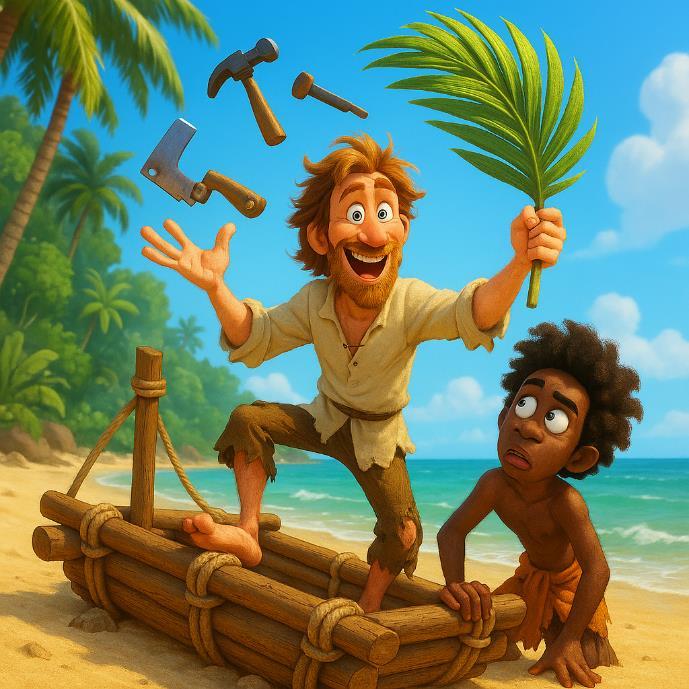
By this time, I had been on the island for twenty-seven years. But the last three years with Friday were different. Though we lived with the fear that the savages could return, life felt more hopeful. But now, with a boat and a friend to help me sail it, I believed we might soon be rescued.
We began preparing for our trip. I set aside food and supplies. One morning, I sent Friday to find a turtle. He came running back, terrified. “Three canoes! Many men!” he cried. I calmed him down and reminded him that we were in this together. He promised, “I die when you die, Robinson.” I feared that Friday and I had waited too long.
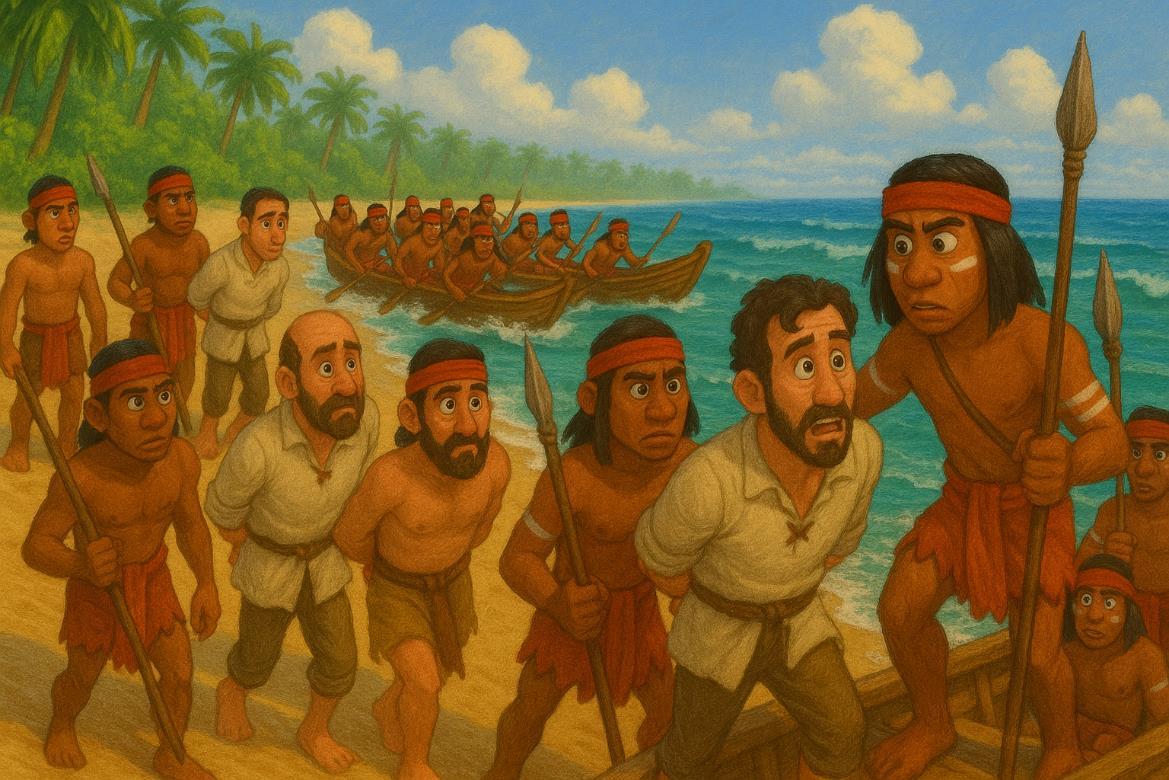
We got our weapons ready—muskets, pistols, and bullets. I gave Friday a hatchet and two guns. I took my sword and four guns. We climbed a hill and used a spyglass to see what was happening. There were twenty-one savages, three prisoners, and three canoes. They had landed even closer to our home than before!
We crept through the woods to get closer. I made Friday promise not to do anything until I gave the signal. As we moved, I started to question myself. Was it right to attack these people, even if their actions were cruel? I decided I would wait and only act if God showed me a clear reason.
We got close and saw the savages by a fire. The three white prisoners were tied up. I wanted to help them, but I waited. We moved to a better spot, just eighty yards away. Now we could see everything clearly. I knew we had to do something soon.
QUESTIONS TO CONSIDER AS A FAMILY:
1. Robinson realizes that he had taught Friday about the rifle but had never taught him about the things that a rifle could do or why and how a rifle should be used. Why is it important to consider “why” and “how” and not just “what”?
2. Over time, Friday’s understanding of death was changing. He went from simply understanding that death was part of his experience to understanding that death represented an “end” and was sad. What do you think was happening in Friday’s heart and mind during this time?
3. At one point, Robinson sees that Friday’s heart and mind are ready to hear the “good news” and he wonders if all men are ready to hear this news in the same way. What do you think?
4. Robinson explained the “good news” of the Gospel to Friday and Friday prayed to become a Christian. How does a person become a Christian? Have you fully trusted God as your Savior, asked for forgiveness of sins, and decided to follow Christ with your whole heart and life?
I knew I had to act fast. Nineteen of the savages were standing around the prisoners and I knew this meant trouble. They had already pulled spears and I turned to Friday and said, “Do exactly what I do.” He agreed. We each set down one musket and held the other, ready to fire. I asked if he was ready. “Yes,” he said.
I watched as one of the savages prepared to harm the prisoner. I knew the time for action had arrived. “Fire!” I said, and we both shot at the same time.
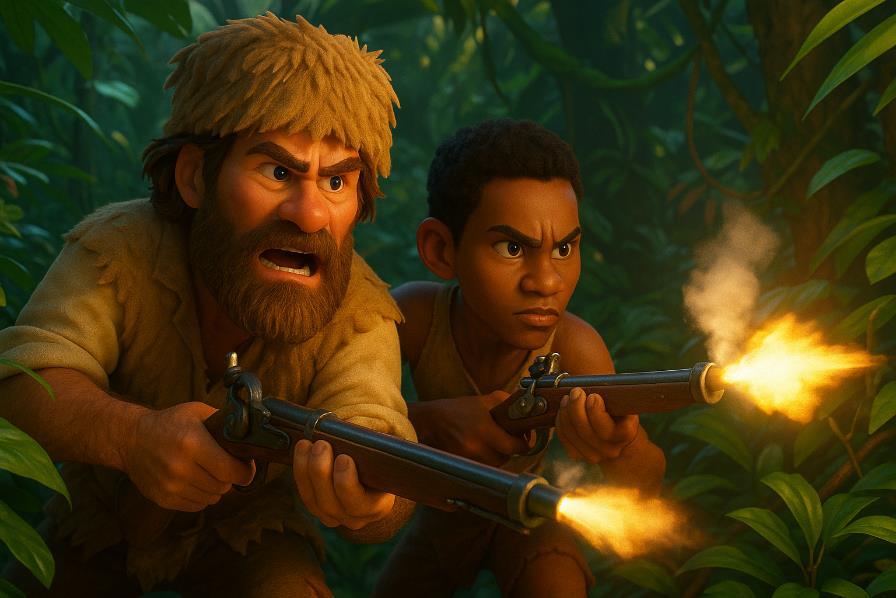
Friday aimed better than I did. On his side, he hit two of them right away, and then hit three more with a second shot. I hit two on my side. The rest were shocked and confused. They didn’t know where the shots were coming from. Some jumped to their feet but didn’t know which way to run.
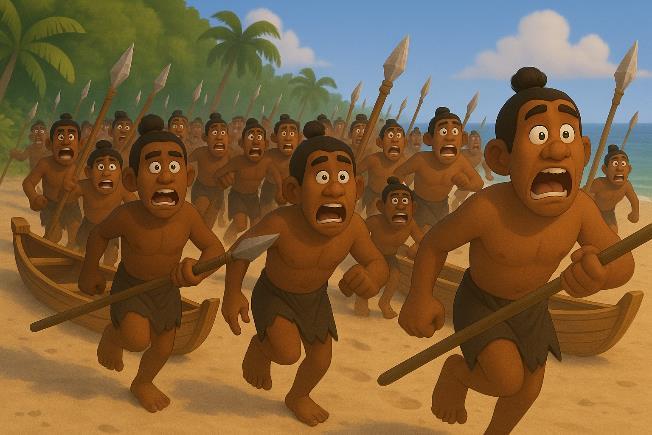
Friday watched my every move. After I fired the first gun, I set it down and picked up the second one. Friday did the same. I cocked it and aimed. “Are you ready, Friday?” I asked. “Yes,” he replied. “Then fire, in the name of God!” I said, and we both shot again.
This time, our guns were loaded with smaller bullets. We hit several more. The savages ran around yelling and screaming Three more fell down, though they weren’t dead.
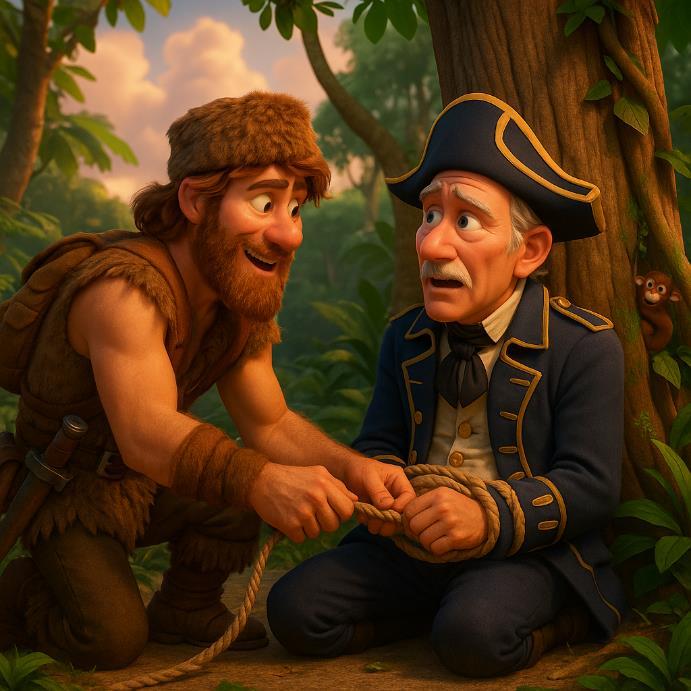
I grabbed our other loaded guns and said, “Follow me!” Friday came with me bravely. We ran out of the trees, and I shouted loudly so the savages could see and hear us. Friday did the same. We rushed toward a poor man lying tied up on the shore.
Two of the savages had just been about to grab him, but they ran away in fear when we fired into the air. They ran to the sea and jumped into a canoe. Three others followed them.
I told Friday to run forward and shoot over their heads to scare them. While Friday fired at them, I ran to the tied-up man, took out my knife, and cut the ropes around his hands and feet. I helped him up and spoke to him in Portuguese.
I asked the man who he was. In a weak voice, he said, “Hugo.” He was so tired he could barely stand. I gave him some water and a piece of bread. He drank and ate slowly. Then I asked where he was from. He said, “Spain.” He tried to tell me, through hand signs, how thankful he was that I saved him.
“Señor,” I said using what little Spanish I knew, “we’ll talk later now we must fight. If you have any strength, take this pistol and sword.” He took them and, suddenly filled with energy, ran at the nearest savages.
The truth is, all the savages were so shocked by the noise of our guns that they froze. Several didn’t even try to escape. Even the ones Friday shot in the boat had fallen some from the wounds and others from fear.

I still had my gun loaded and didn’t want to waste the shot. I told Friday to run back to the tree where we first fired from and get the other weapons. He did so quickly, reloading them fast. Then I gave him my musket and sat down to reload the rest myself.
While I was reloading, the Spanish man got into a tough fight with one of the savages. The savage had a big wooden sword and attacked him hard. Even though the Spaniard was weak, he fought bravely. But the savage was strong. He grabbed the Spaniard and pushed him down. He tried to take the sword. The Spaniard grabbed a club from his belt. With one solid hit, he knocked the savage out cold.
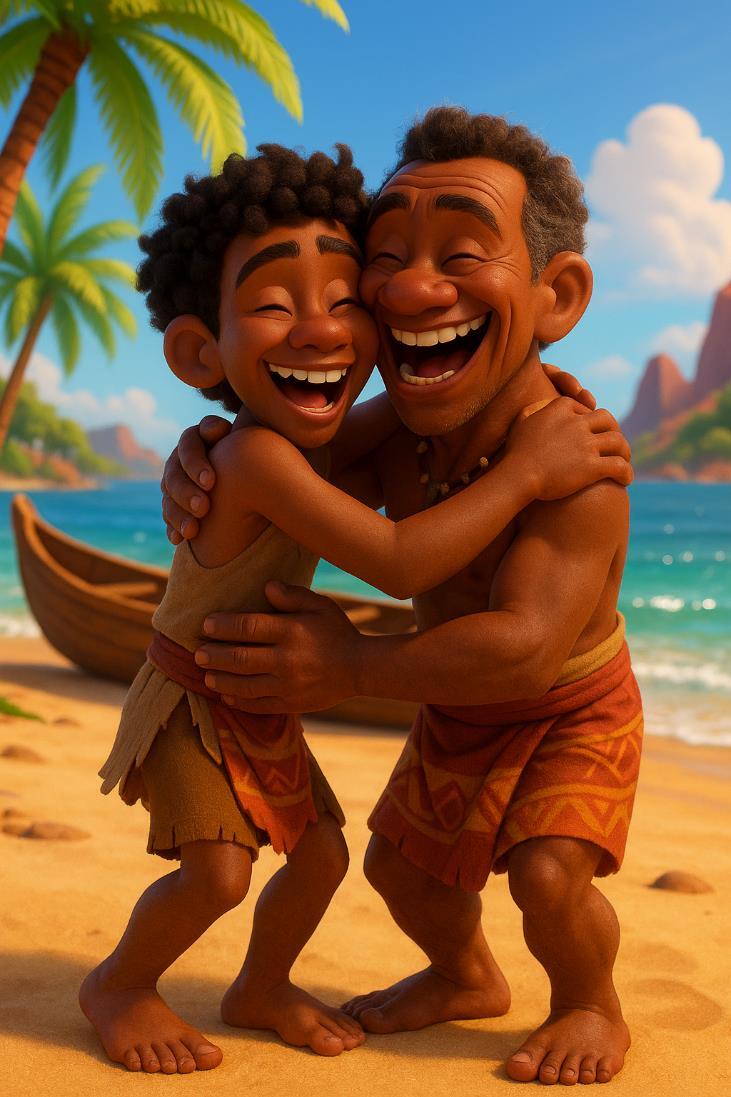
The Spaniard asked me for another gun. I gave him one of the pistols. He chased after two savages and shot them both, but he couldn’t run fast enough to catch them. They got away into the woods. Friday ran after them. He caught up to one and knocked him out, but the other was too quick and escaped.
One of the wounded savages jumped into the sea and swam toward the canoe that had two others in it. They worked hard to paddle away and get out of our shooting range. Friday fired at them a few times, but I don’t think he hit any of them.
Friday really wanted us to chase after them. I was nervous they might return with hundreds of other warriors. So, I agreed. We ran to one of the canoes and jumped in.
As soon as I got in, I was surprised. Another poor man was lying in the bottom, tied up hand and foot. He was shaking with fear and hadn’t even looked up because he was tied so tightly. I quickly cut his ropes, but he was too weak to stand. He just groaned, thinking we were going to hurt him.
I told Friday to speak to him and explain that we had saved him. Then I gave the man a drink of tea. That, along with Friday’s words, helped him a lot. He sat up slowly.
As soon as Friday heard him speak and saw his face, something amazing happened. Friday suddenly hugged him tightly, laughed, cried, and shouted with joy. When he calmed down, he told me, “This is my father!”
Seeing how much Friday loved his father touched my heart. His joy ended our chase of the other savages, who had almost disappeared by then. And it turned out to be a good
thing. Just a couple of hours later, the wind blew hard and a storm came. The sea became rough, and we wouldn’t have been safe in a canoe much longer.
Friday and I brought his father and the other prisoners back to our camp. But, we knew there was no time to lose. There was now no doubt that the savages knew we were here. And, they would be angry. We decided the time had come to load our supplies into the boat that Friday and I had built and set sail.

What happened next surprised me. As we loaded the boat, we spotted a large wooden ship approaching over the horizon. At first, we were alarmed, expecting that the savages had already returned. I grabbed my spyglass and recognized that these were not savages but sailors.
We remained hidden and watched as the ship approached our shore. Because voices carry well over water, I could hear that these were English men. Soon, they dropped anchor and lowered a small boat into the water. Ten English men brought three English prisoners to shore and wandered around. I got ready for a fight, but hoped that they were friendly.
As the men explored the beach, I carefully approached the prisoners who were sitting alone, tied to a tree. They were looking very sad. I looked wild in my goatskin clothes, with guns and swords. At first, they were scared, but when I spoke English, they were shocked and hopeful. One man told me he was the captain of the ship that was off the coast. His crew had mutinied and intended to leave him and his only two loyal crew on the beach as they would sail away. I told him I would help, but he had to promise two things: obey my orders and take Friday and me to England if we got the ship back. He agreed and we cut the ropes that had been used to bind them to the tree.
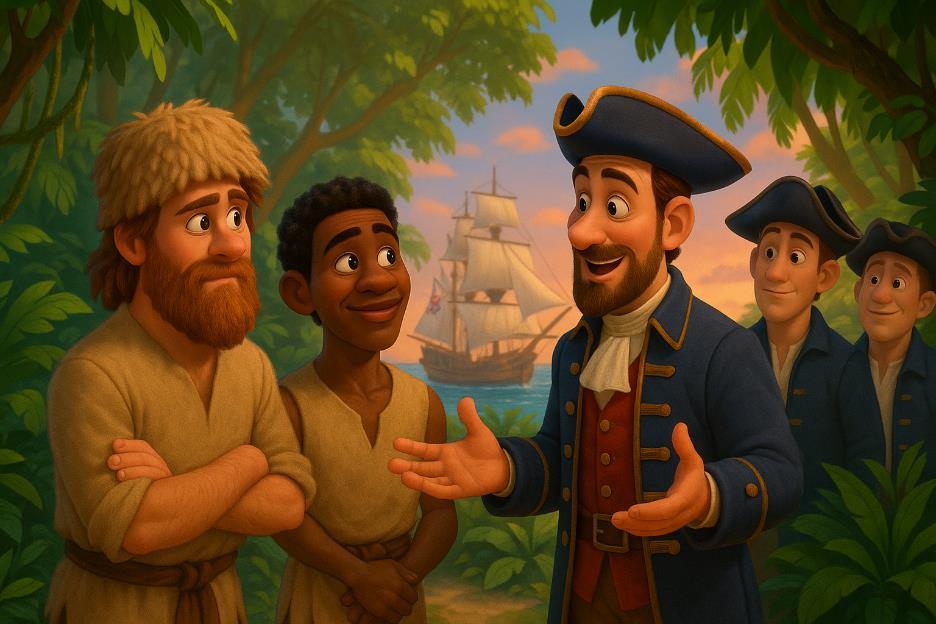
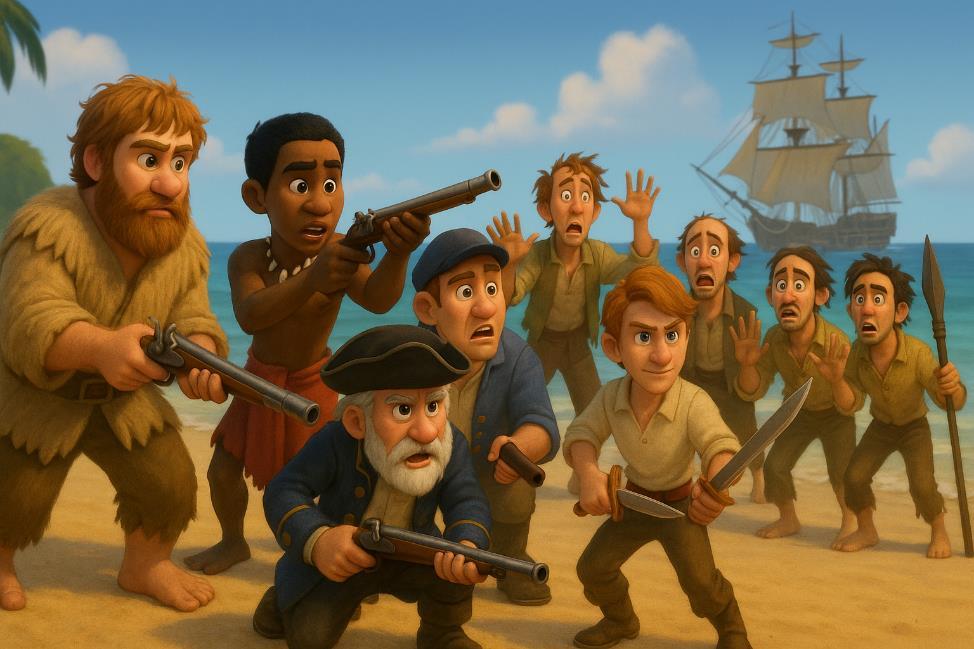
We came up with a plan to capture the mutineers. The captain pointed out the two worst men, and we agreed they should be taken by surprise. The captain and his men sneaked up and knocked them out with clubs. Hearing the noise, the other mutineers turned and saw our wild looking group holding weapons over their friends. They quickly dropped their weapons which Friday grabbed away.
We tied them up and walked them back to my cave. We gave them all of my food and drink. I laid out my tools for them to see. I explained how I had come to the island and made a life for myself. Friday explained how the two of us had met and how the Spanish men and his father had come to join us.
The captain was amazed by my story and my fort We planned our next move: to capture the remaining rebellious men that were waiting and retake the boat
I explained that we would not kill the men but give them a choice. They could join our crew and sail back to England where they would face justice. Or, they could remain on the island, using my home and supplies to survive. As they thought about this, we broke up the boat they left on shore so they couldn’t use it.
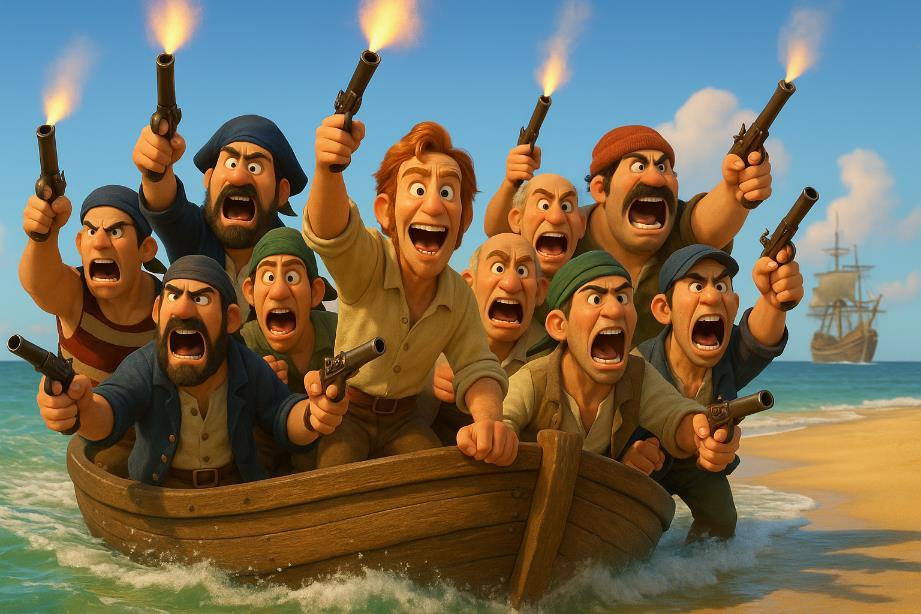
A few moments later, Friday alerted us to the fact that the ship’s crew had sent another boat with ten men. Their friends had not returned to the boat and they were very confused. As they approached the shore, they yelled and shot their guns, but no one answered. They landed their small boat and immediately saw that their friends were
missing and their boat was broken up. They pulled out knives and guns, looking cautiously into the jungle. Seven men went to look inland while three stayed on the beach the boat.
I sent Friday and the captain’s mate to trick them by shouting from the trees. The seven sailors followed their voices deep into the jungle. When they were far enough out, Friday and the captain’s mate remained quiet and watched. Suddenly, the seven men realized that they were lost. They shouted and shouted, firing their guns in the air. There was no response. Friday and the other man made their way back to the beach and joined us hiding in the trees.

As this happened the sun began to set. The jungle animals and insects made their evening noises and the both the seven men lost in the jungle and the three men on the beach grew sorely afraid.
After darkness had settled over the entire island, the leader of the mutiny and two others came close to the tree line where we were hidden. Friday and the captain attacked. The leader was knocked out. I and the rest of our group jumped in.
I yelled out, “Drop your weapons, you fools! We are fifty men with weapons. If you resist, we will bury your bodies here on this beach tonight! If you surrender now without a fight, you might live to see the morning!” The mutineers believed me. They begged for mercy and surrendered. We tied them up and placed them in the cave with the others.
We now had control. The captain was back in charge, and the ship was ours again.
I went from the happiest point in my nearly three decades on this island to my saddest moment. I recognized that Friday and I had choices to make. I now had an English ship waiting for me off shore with a grateful captain and crew willing to return me home in England. And, Friday had his father and the wooden sailing ship we had constructed.
“Friday,” I said, my voice trembling with emotion. “We don’t have long to make these decisions. We have nearly twenty men bound and angry in a cave. Soon, they will break free of their ropes and come looking for us and revenge.”
A single tear came to Friday’s eye and I knew that he understood this moment.
“Friday,” I continued, “you have been a better friend to me than I have ever known. I would relive this entire adventure from the start if I knew it meant finding a friend like you.” Friday nodded and looked down at the sand. “But now, you have a choice to make. Will you return to England with me? Or, do you desire to return home?”
Without a word, Friday hugged me close and tears fell from his eyes. I knew in that moment what he must do.

“Robinson,” he said, “you also good friend to me. You teach me many things. But, the most important teach is God. My father, my family, my friends are home on my island and they have never heard about Him or His Son, Jesus. I want to go to your England and learn more but that choice would be bad. I must stay and give good news to my tribe.”
I looked up at the moon which hung brightly in the sky. “Friday, our moon is the same. When I am home and looking at the sky, I will see the moon and think of you.”
“I will think of you,” Friday said.
These were the last words we said to each other. He loaded supplies and his father into the simple sailboat we had made and pushed it out into the water. The captain and I took food and what crew that remained, loaded into the small shore boat, and pushed off towards the ship and England.

After returning to England, I settled into the trade of ship-making. And, though I had no desire to leave English shores again, my ships became famous with sailors that did. My business grew and I found the riches I had always wanted. But, now, money did not matter to me like it once did. Each clear evening, I strolled out along the shore and gazed upon the moon.
Eventually, I married and started a family. I imagine that Friday did the same. When my second child, a son, was born, I made a special request of my wife.
“I would like to give him a special name,” I explained. “This is a big favor because the name is not a customary English name.”
My wife obliged my request but asked what the name would be.
“Friday,” I said. “Friday Crusader.”
QUESTIONS TO CONSIDER AS A FAMILY:
1. Early in our story, Friday decided that he would never hurt any of the savages unless he had to in order to preserve his life. In this part of the story, Friday and Robinson shoot at the savages. Was this the right thing to do? Why or why not?
2. When Robinson and the ship captain recaptured the ship and the mutineers, they gave them the choice to return to England and face justice or stay on the island, living as Robinson had lived. Was this the right thing to do?
3. Robinson mentions that, after returning to England, he had no desire to sail again. This was much different than he felt before he left at the beginning of the story. Why do you think he no longer desired to sail?
4. Imagine that you were Friday and given the choice that Robinson offered him at the end of the story. What would you have done? Why?
5. Romans 8:28 tells us that all things work together for good for those that love God and are called according to His purposes. Because we live in a world that is broken by our sin and failure to follow God’s commands, it is easy to misunderstand this passage of scripture to be sure. It doesn’t mean that God causes bad things to happen so that He can use them for good. It means that we have chosen bad things, in spite of God’s word, and He still persists in trying to take the bad things we have chosen and use them for good. For example, at the beginning of this story, Robinson ignored the wisdom of his parents and pursued riches. This was a bad choice. But, God used Robinson’s bad choice to do wonderful things for him. Can you think of other examples like this from the story?
